|
Although it's probably more revealing about my YouTube consumption habits than anything else, my latest Substack post is now up,.
I'm experimenting with moving this blog to Substack, if nothing else because it makes it easier to publish.
Check out my latest post. - E.G.
EGPhest 6 is August 6th 2022 at Bazaar Cafe in San Francisco. Here's the roster of players that will be joining to play a tune from the E.G. Phillips ouvre.
Michael Bang
Shawn Cody
George CothranBrendan Getzell
Alex Jimenez
Zeke Ketchum
Francesca Lee
Joyce Lee
Michelle Luna
Ken Newman
Renee Padgett
Drew Pierce
Suzanne Ramsey (aka Kitten on the Keys)
Leon Rosen
...and Introducing Year's EGPhest Visual Artist: Oscar Plizga
https://www.instagram.com/lonely_dingo/
Oscar sculpts, sings, and dreams up amazing recipes. We are lucky to have some of these in menu rotation! His intricate guitar case art is worth investing in! A small collection of Oscar figures (including Vanity, Despair and Malevolence) are for sale in the cafe.
For an artist just developing their following, getting your music heard is an uphill battle. Recently, however, I achieved a bit of milestone — one of my recent releases, “The Octopus Song,” achieved 1000 plays (or spins) on Spotify. This is significant in that until you have at least 1000 spins, no play count is displayed, or worse you see "<1000" plays. Is it 1? Or 999? Doesn’t matter — your song is just a loser like all the other 60,000 pieces of detritus that get uploaded daily to Spotify.
Getting onto playlists on Spotify is an important way to get your music exposure to a broader population outside your own fanbase, which, as with all good Catch-22s, can be difficult to grow without getting more exposure. The dominance of Spotify within the streaming landscape makes it hard to ignore as a platform, regardless of the low payout per stream. Getting on a playlist with a decent sized following is equivalent to getting on the radio in past eras of mass media. Additionally, being on a playlist has an impact on Spotify’s own metrics that they use to determine how you appear on their algorithmic playlists, which means additional exposure. A playlist, as I’m sure you’re aware, is simply a list of songs created by either Spotify or an individual user of Spotify. Consider it akin to the mix tap of old, for those of you who remember such mediums — but the concept will no doubt be familiar to anyone who grew up in the digital media age. The main difference with Spotify is just the size of the audience you can reach through them because such playlists can be shared. Other platforms are trying to replicate this feature, but not nearly to the level of success Spotify has had user experience-wise. Of the playlists Spotify manages, there are those that are manually curated by Spotify and there are the “algorithmic” playlists. Spotify Curated Playlists There are in fact, many, many Spotify curated playlists targeted at different demographics and they dominate the playlists in Spotify in terms of the number of listeners who have given them “likes.” The only way to submit to these playlists is prior to the release of a song through your Spotify for artist's page. The process for actually being selected is a bit of a black box, but there are a couple of things we can discern from the input selections they offer to categorize a song — notably they have a limited number of moods and styles they have defined in addition to genres and music “cultures.” They also have a motley selection of instruments to chose from, which makes one wonder if you have a better chance of curated placement if you start to incorporate some more exotic instruments into your sound like a Buzuq, Mbira, or Oud. There are also some interesting omissions — for instance, there is no “Upright Bass” option (only electric) and of the eclectic mix of ethnic instruments, I don’t see any that are typical of Brazilian Samba music — where this the berimbau, the cavaquinho, or the pandeiro?
Spotify Algorithmic Playlists
The algorithmic Spotify playlists target individual listeners based on their listening habits — the important ones are the “Weekly Discovery” and “Release Radar” playlists. In theory these target people who follow you or people similar to those that like your music, but the details of how you appear on these playlists aren't entirely clear. However it’s fairly easy to discern what could potentially affect them based on the metrics that Spotify has available (song spins per user, song saves, playlist adds for a song — to name the most obvious ones). It’s also clear that there is a limited period after the release of a new song for which these metrics have an impact. Spotify says that pitching to them a week in advance of its release means the song will appear on the Release Radar of your followers, but it seems that that is not the only factor as I have seen many Release Radar plays after a song has been out in the wild for a couple of weeks— more than I have listeners. User Playlists The user playlists are those that fall into basically two camps — playlists created by end users primarily for their own personal use and those that are more “professionally” curated. The personal playlists may be shared by their creators with some friends and have a small following, but their ability to impact your play count directly is fairly limited and they are not playlists you can generally target for submissions. However, that individual users are putting you on a playlist is clearly a useful datapoint for Spotify and they even report to you the number of playlist adds you’ve received, even if the numbers don’t jive with the playlists they report spins on. Then there are the more professionally curated playlists. These are playlists that have a large following (roughly measurable in their “likes”), are actively managed (some playlists you will discover are no longer a going concern, despite a large following), and are the playlists to which you can submit. Unlike Spotify playlists, you can submit to them even after your release. These playlists vary dramatically in their popularity and ability to generate you spins. There are basically three ways to get on these curated playlists:
You can pitch to to playlists directly if you can find their contact information. This may be as simple as an email or social media account they expose in their playlist description (or you can hunt down with some detective work with Google and social media searches). Alternatively they have a more elaborate mechanism such as website form, or even using Kofi — though to me these often seem sketchy. There was one where it was basically saying, if you bribe me (with an amount unspecified) you can jump ahead in my 4 month long queue (the submission form seemed to be broken, so c’est le vie). And there are of course a fair number “upsells” going on for additional levels of coverage. I do have misgivings about the direct route when fees get involved just because at least when you go through a service as described below there’s a bit of accountability with ratings as well as some tracking of the curators acceptance rate and performance. You can also pitch to playlists through third party websites. For this, there are basically two models — one where you select the curators you want to target directly (what I will call “client directed”) and one where the submission service does the targeting for you (or “service directed”). Not surprisingly both involve fees to the submission service, some portion of which goes to the curator. Client Directed Playlist Pitch Services There are two main players in the space of client directed targeting, SubmitHub and Groover. SubmitHub is perhaps the most well known of these service. For each submission to a curator (and this includes blogs, YouTube channels, and labels as well as playlists) you pay a fee based on a credit system. You are allotted some free credits, but honestly, don’t bother unless you really don’t have funds. There are also premium credits you pay for where 1 credit equals roughly 1 dollar, minus whatever discount you get for purchasing in bulk. The curator is under no obligation to place you, but they are required to listen for some duration and may be required to give you feedback. You search for curators by attributes like the genre they accept and you can listen to submissions they recently accepted to get a sense if you might be a match (it can also be disheartening when you hear what they’re willing to accept when they won’t accept your work). The feedback is often of questionable value as these are not necessarily people who are even that educated about music, just opinionated. It may give you some insight as to whether it is worth trying to submit to them in the future — you may get some clarity in what they are actually looking for or just come to the conclusion that they are unlikely to ever place you because they don’t like your voice or some such issue. They do get a small portion of the fee for the submission so there are some perverse incentives built in to take as many submissions as possible even if it means doing a lot of arbitrary rejections (depending on the preferences you select for feedback they don’t get their cut of the fee and the fee is refunded to you if no feedback is provided). Groover is a sort of SubmitHub clone based out Europe. It’s newer and less mature — I actually participated in a session to give them feedback on rolling out a new feature for rating your reviewers feedback, a feature SubmitHub has had for a while. The fact it’s based in Europe means the credits are automatically more expensive because of the exchange rate and foreign transaction fee — also there are no submissions that cost less than two credits (or Grooveritz as they call them). There are a couple notable differences. First, there is a wider universe of foreign curators — I found a lot of Brazilian playlist curators that I’ve not seen on SubmitHub which tuned out to be rather handy for one of my tunes. Second, while SubmitHub requires curators to turn around their feedback within 48 hours, which to me seems aggressive, Groover gives their curators a full week to give feedback, which shouldn’t much of a hardship for submitters as they already have to plan to submit to Spotify itself well in advance (they say a week, most people who give advice on such stuff recommend a month or more lead time). There are some other differences, such as the ability to submit to “mentors” for advice and “synch” companies — the latter of which I did try to no particular avail. There’s also Artist Republik as an option for client directed targeting, but I’ve had much less experience with that platform. I’m put off by the fact the genre labeling on the playlists is absolutely ludicrous. There is no way all these playlists accept both Country and EDM tracks (every playlist seems to be labeled with every genre under the sun for some reason). I tried it because they gave me a coupon through PayPal — otherwise it would have been five dollars, which is on the higher end for playlist submission. Eventually my track was accepted by the curator… twenty some days later. And the track still is not actually on the playlist. Service Directed Playlist Pitch Services The second model for playlist submission is one where you leave the targeting up to the service doing the submission. The two service directed playlist submission services I’ve tried are PlaylistPush and SoundCampaign. In both cases you provide a list of genres derived from artists you select and they select playlists for you in a way that is frankly, opaque. You do have some options with PlaylistPush to limit or target particular playlists, but unless you already have significant experience with their platform, figuring out who those playlists are is basically impossible as a significant portion of their IP seems to be knowing the curator landscape and they don’t expose that info readily. How many of the universe of possible playlists you submit to depends upon how much you are willing to pay up to some maximum — but once again, the targeting is opaque. You don’t know what slice of that set of possible playlists you’ll wind up submitting to unless you pay the full cost. The problem is that the criteria they use for selecting playlists doesn’t take some obvious things into account, such as whether or not the playlists wants vocal tracks ( a big issue if your music could be loosely classified as jazz) and there’s nothing that describes the mood or vibe the playlist is going for. So there are a lot of misses for at least your initial campaign — PlaylistPush does allow you to mark curators as ones you don’t want to submit to in the future if you give them a low rating. That said, I got onto a playlist I wouldn’t have expected to precisely because the criteria is so broad — a curator I know from SubmitHub who only takes instrumental jazz tracks ended up taking one of my vocal tracks simply because he liked it and that’s been my greatest sources of plays to date. There’s a lot of overlap with curators in these systems, they are not exclusive to one or the other and Groover has noticeably increasing its list of available curators, many of which I recognize from SubmitHub. Ultimately this actually quite a small universe of independent curators that are actively managing playlists of any significant size. And those that are typically only have one playlist that will give you much exposure. Even if the service reports a large following, when you start looking closely at the playlists they manage, the story is often far less rosy than the top line number being reported to you. More often than not, even if your song is accepted, you end up getting thrown onto a playlist with an order of magnitude fewer followers than their main playlist — which is the difference between getting 100s of spins a day vs a few dozen overall (if you even break out of single digits). This is not a venture that often pays for itself, at least not directly. Other Playlist Pitching Services There is a third model that is an interesting hybrid between client directed and service directed. MusoSoup allows you to submit your track such that is available for curators to discover and then offer a bid for the track and additional coverage on top of either playlist placement or a social media shoutout, which is the “free” option available to you (not counting the initial MusoSoup fee). While it’s distasteful to pay for coverage and you are generally told not to do it, the rates are not exorbitant. The main problem is that the quality of the writes up can be fairly low so do some vetting before you commit to doing anything. Even the shoutouts can be pretty lame. You are paying in British pounds, so be aware the exchange rates and conversion fees. Note that a lot of these curators will want a “shout out” on social media for placement in return, which has led to me doing a lot of posting to IG with screenshots of playlists I’m on. I don’t see a lot of other artists doing this, so maybe it’s not obligatory as they make it sound… I don’t know. It does seem like a useful reminder to your audience that your release is out there and getting some traction. I’ve seen ads for other services on Facebook that I haven’t tried yet and I’m far from any expert on how you get placement. You will get a lot of rejections and a lot of them are lame. Even an outlet that is friendly towards you one release will become weirdly nit-picky they next. The rationales you are given sometimes seem utterly trite, arbitrary, or just plain indecipherable. You are dealing with people’s tastes and whims of the moment. The fact I got on a bunch of Brazilian playlists didn’t help a whit with the German who said he was “unconvinced” by the Bossa Nova. And whether they are really accepting more submissions or they’ve actually reached some quota already, who knows. It’s hard to trust that the rationale they gave for rejecting the track has anything to do with what’s going on beneath the surface. The Current Playlist Landscape The fact of the matter is, after looking through the automated crawling that PlaylistSupply offers, there are just so few of these playlist curators out there that can have an impact and they are utterly dwarfed by the Spotify curated playlists. If there was ever a possibility of playlist curation being “democratized” to the masses, it’s clear that Spotify has decided they will push their own playlists to manage the experience of their users. I mean I came across a Spotify playlist called “Dark Academia Jazz” — so they are obviously aware of even relatively obscure cultural trends and doing their best to target the “micro genres” that are out there. That’s a playlist, by the way, that has 50K+ likes. It’s rare that user created playlists cracks 10K. I’m not terribly enamored with any one service in particular. I get the impression that the service directed push platforms have curators on them that simply aren’t available on SubmitHub and Groover, but they are expensive and are not doing an especially good job at curating the list of curators they send to — so the time you are saving by not investigating playlists yourself is a bit wasted because it’s very much a blunderbuss approach on their part. Many curators seem to suffer from a lack of understanding as to how music produced and distributed so they tend to act as armchair quarterbacks when it comes to production — they suggest changes that simply aren’t realistic given the other factors involved. Certain suggestions may be helpful, but making placement contingent on what are sometimes minor issues of taste often feels more like searching for an excuse to reject the track. Some curators seem just to want to kibitz. I have summarized SubmitHub as “I will pay you a dollar to hear ten mean words about myself.” There’s not a lot of opportunities to have a dialogue with these curators or really build relationships with them and though there are metrics in place to ensure they listen, there are still obviously some who do not really listen and some that just copy and paste their responses. I think the current model for getting playlist promotion is inherently corruptible and the reward system is out of whack. Curators are not rewarded based on the success of the engagement with their playlist by Spotify as platform (say the way a radio station would have been rewarded with advertising dollars in days of yore), but rather they are paid by artists regardless of whether they offer anything valuable in exchange. Some may be well intentioned, but others seem to be on a bit of an ego trip and have ideas above their station. There’s also obviously room for grift and palm greasing — some of it quite blatantly out in the open. In fairness, these curators may well be inundated with requests, but it is the rare curator who simply admits that they are currently at some target metric for new songs and simply aren’t accepting any more submissions. Sometimes they do go on break, but it’s rare that you see someone who takes advantage of the submission limit feature SubmitHub offers them. But once again, the incentive is to take as many submissions as possible, which means there are going to be a lot of rejections. And in a land of plenty, it is probably easy to reject anyone in particular for whatever arbitrary reason because you know there are more where that came from. Often it doesn’t seem like curators are operating in a way that is to the benefit of the artist given Spotify’s emphasis on early numbers. I’m especially skeptical of playlist curators who only want released tracks, While I can understand wanting only tracks that are definitely going to be released on a date certain and have been mixed and mastered, if you’re not willing to help out an artist with getting traction on the date their song releases (which obviously requires advanced screening before its on Spotify) then you are either not aware of how the Spotify ecosystem really works for artists or you don’t care. There may even be certain level of “we’ll hang back and wait for other people’s reactions” — whether this is born out of skepticism of their own abilities to evaluate a track or pure opportunism, who knows. I have noticed at least one playlister that operates this way tends to favor mostly well established artists on their most popular playlists and then throw others on a much less frequented “new finds” playlist. Then there are the enormously long playlists where all the tracks from newer artists are tacked on at the end, so the utility of your placement there is dependent on someone using shuffle play and randomly hitting the track. Another issue I have is that so many playlists are designed for ambiance and mood to simply be played as some sort of amorphous background wallpaper, instead of based on engaging with the listener. So the system rewards targeting a limited number of moods and emotional states — instead of taking users on a journey, music is expected to be static and non-disruptive, without contrast or development. Maybe it’s always been this way, but like everything in our social media universe, it feels like Spotify amplifies the worst aspects of social interactions as opposed to promoting meaningful and rewarding engagement. And the path to developing your audience is really quite limited. The playlists that Spotify curates are really geared towards artists that are already in some way established. They have a such a tight grip even on playlist curation that despite that fact it as a platform wants artists to be constantly supplying them with new content on a regular basis, its mostly artists with a significant and predictable following that end up on the big playlists. Concluding Thoughts It’s hard to ignore Spotify given its dominance in the word on streaming services. But I’m skeptical of it being a place where you build a following. Certainly some people may hear your song on a playlist, save it (an important metric), and become fans — but the platform itself doesn’t seem they are terribly invested in developing talent. Playlist pitching isn’t the worst way to gain traction on the platform — pre-saves, being the terrible hack that they are, get that distinction — but the ecosystem of playlists is not a friendly one. You can certainly do better by putting some effort into it yourself than you can through paying some PR agency — I got onto a grand total of one playlist through a PR agency and I don’t think I got any plays. But even placement on a playlist is no guarantee you get any traction — it takes a lot of small playlists to make a dent and it’s a race against time for Spotify’s metrics to care. Anyway, in conclusion, my journey to getting a 1000 plays is really just dumb luck of getting onto one of the few independent playlists that will generate you a substantial number of spins. In reality you have to get on many playlists, and even then I don’t think there are enough out there to really give you that significant a boost in the amount of time you’re likely to remain on that playlist before getting shuffled out. It is a weird thing, trying to get people to pay attention to you and your music. After decades of feeling self conscious and shy about what I was doing, getting the gumption to put it out there by going to open mics and performing was one thing, but it’s a whole other conceit to actually try and get people to listen in the wide wide world. The reasons people listen to music are many and varied — and who they listen to and why is as much about social behavior and relationships as it is about what the music itself communicates. The whole pantomime of submitting to these various gatekeepers to get their approval so it will reach more people can be dispiriting and feel farcical, if not corrupt and dehumanizing. And it does at times make you even question why you're doing it or if it’s all the important in the end. For all the clout chasing and hyping you need to do to cut through the noise of this oversaturated and attention deprived world, ultimately, for me, it’s about having created something and wanting to share it with people who will appreciate it and find meaning or comfort or joy. Hopefully those are things that still exist. - E.G. This is a great testament to the wonder of the octopus! I am honored, cheered, and deeply moved at a song that is at once nimble, clever, and profound."
When he learned about my upcoming release, my Dad sent me this photo from the Octopus Garden in Hawaii, which is actually quite relevant.
The Hawaiian Kumulipo is an an 18th-century chant in the Hawaiian language telling a creation story over the course of a cosmic night. Anthropologists from the 19th and 20th centuries interpreted a recurring verse as describing the octopus as the sole survivor of a previous age of existence. Although that translation is in dispute, this tale itself has morphed into the notion that there is a Hawaiian myth that octopuses managed to squeeze through a rift between worlds when our world was created and the previous one was about to be destroyed. Whether it's accurate or not, it made for a lovely jumping off point for the chorus of “The Octopus Song” and could easily be mistaken for one of my many references to Doctor Who. It also became the source for the album title that this tune will be a part of — “Alien from an Alternate Earth”
In May of 2018 I had a show scheduled at Oakland's sadly now defunct "Octopus Literary Salon" with Matt Jaffe and Rob Jamner, both of whom I knew from the open mic scene. Rob had actually invented me to play a show of his at Bazaar Cafe based on my lyric postings. Matt was in attendance as audience and I decided to wrangle him and Rob to be part of a show across the bay. At the same time I came across Sy Montgomery's "The Soul of an Octopus." Inspired by that book and thinking it would be fun to have a song to promote the show with, I decided to write what became "The Octopus Song."
In the book Sy describes her relationship with various octopuses she had met in the course of research the book, and some of the episodes she relates became the basis for verses. As mentioned, her reference to the Hawaiian Kumulipo inspired the chorus but there were bits of found poetry such as the lines about the nature of consciousness that I worked into 1st bridge. I shared the song with Sy and she was delighted, as indicated by the quote at the top of the blog.
The music and overall structure of the song was inspired largely by Nat King Cole's "You're Looking at Me" — I used the chords as a jumping off point for developing my own harmonic progression but also I liked the reveal at the end. At the time I was gigging regularly at the Hotel Carlton, playing during their evening wine service. I'd fallen out of a long term relationship with a particular code base that had led me through multiple iterations of companies and locations in the Bay Area, and this engagement was my main connection to the wider world for a time as I decided to take a break from all that tech stuff. I played the song out quite a bit. I remember playing the Riptide open mic on Christmas Eve and one of the other players got a real kick out of the chord progression. I also played it a couple of times for West Coast Songwriter competitions, from which a pretty good live recording was made when I was at the Freight and Salvage. One of the judges circled the line about the wishing well and had a question mark next to it, which is funny because other folks have told me its best line in the song. Recently one of the denizens of the open mic circuit said recently that he thought it was a definitive (or words to that effect) E.G. Phillips song.
With a late night vibe and horn interplay from Rich Armstrong and Daniel Casares reminiscent of Gerry Mulligan and Chet Baker, the instrumentation of this recording of this song is that of a classic West Coast jazz ballad. The recording of the horn parts was done as part of a rapid-fire 3 hour session where all the horn parts for the big band number "Brave Heart, Luna!" were recorded as well as horn and flute parts for 3 other tracks. This is in no small part due the skill and efficiency of producer Chris McGrew who had a knack for making sure we had the right folks for all the talent we brought into the studio as well as being a bit fearless in not only generating ideas on the fly but also being definitive as to what was "the" take so we could move without delay to the next part. There is also Kevin Seal on piano, who lends some sympathetic support and was able to quickly adapt to the ideas being thrown at him, such as the suggestion to add a bit of piano lounge flair to the last verse to be in keeping with the lyrics. Of course the rhythm section is also lovely with Chris on drums, Paul Eastburn on bass (he also wrote up some invaluable charts) and Jeffrey Burr on guitar. The whole project came together incredibly quickly and it was joy to watch these incredible musicians work out their parts and coalesce around my songs to create a tight, integrated piece — with just enough spontaneity so that we got things like that lovely wind down that closes out this track — unplanned, but at the same time elegant and entirely fitting. I'll have more to say about how this project all came about in future posts.
I'm pleased with the response I've gotten, including a post in Simply Jazz Talk which calls it "whimsical, endearing, and fun" and a woman on Facebook who said she was interested in adding the song to her repertoire. I always saw "The Octopus Song" as one of the central pieces of the upcoming album, which is part why I lifted its refrain "Alien from an Alternate Earth" for the title. While it is in some ways a demented Disney show tune with some silly vocabulary (such a "squirt" and "sucker") I don't see it at all as a novelty song. To me it is quite serious, whether or not you are huge fan of octopuses (which you should be). I hope you give it all the spins. - E.G. I'm just average, common too
One of the tasks I've taken on lately has been to make sure my lyrics are available via Spotify by entering them in and synching them with the music. It’s a bit like looking at old photos. It’s you, but from another time. And there are memories and feelings associated with it all.
This activity is in part preparation for my next release — I have a new single coming out Friday (December 10th) for an album I'm putting out in April — so I’m going through the motions of different activities that CDBaby (my music distributor) recommends you do as a way to promote your music, for what good it may do. It’s a bit surreal embarking on this while watching all the hullabaloo about Taylor’s Swift and her release of her re-recordings of decade old songs, something that when it comes down to it, is only happening because of a rights dispute. Given the devotion of her fanbase and the lack of touring opportunities because of the pandemic (thus reducing any opportunity costs that might come from revisiting the catalogue) it makes perfect sense that she’s doing it. The focus on her 10 minute epic rendition of “All Too Well” and her fan’s sheer obsessiveness about finding clues as to who what song is about has been a bit scary. Not that it's unusual for people to become very invested in the lives and relationships of their favorite celebrities. With the advent of Peter Jackson's release of the documentary "Get Back," a lot of people are revisiting the role of Yoko Ono in the break up of the Beatles. Still, it's a little overwhelming how seriously and personally some corners of the Internet take it all. I appreciated John Elliot’s release of his answer to all this obsessiveness with All Too Well (Jake’s Version), meant to give voice to the other side of one of these relationships. Elliot, as a faux Jake Gyllenhaal, quips that the scarf that is a point of contention and supposedly still in Gyllenhaal’s possession according to Swift had actually accidentally fallen behind a couch and has been there for ten years. However, I wouldn’t take too seriously any critique that Swift is still obsessed with failed and brief relationships as the revisiting of these songs is ultimately for commercial purposes. Aside from the fact lots of artists write about their relationships, it’s a mistake to assume that any songwriter’s feelings about what is written in a song is as trapped in amber as the lyrics might lead you to believe. Sure, as performer you might tap into those old feelings to give a rendition more emotive power — but that’s not the same thing as not having moved on. You create something that reflects a moment, the truth of what you felt then. But putting it out into the world as a song is an act of letting that moment go as you share it. I also think it’s a mistake to read too much of an artist’s personal life into any one song. Dylan certainly demurred when people attributed his seminal “Blood on the Tracks” as being about his divorce — insisting instead it was inspired by a book of short stories by Chekhov. Whether there’s any truth to that (Dylan’s been known to distort things), the sort of close reading critics and fans are apt to engage in detracts from the universality a song is supposed to have. I don’t write a song with the intention that only I can sing it because it’s only relevant to my personal experience. Sure, the personal is the universal and all that — and I believe a song should be truthful and honest to be meaningful. But that’s in service of the goal of making it relatable — therefore performable, and more importantly, internalizable by others. If you need to know a songwriter’s full bio for their work to be meaningful, what’s the point? I have no illusion that there’s any possibility of me reaching Swiftian levels of buzz — nor is that my desire. But it would be nice to know someone cared and it wasn’t so much shouting into the void. Gary Hobish, who mastered my new album, has said that he found it “very honest” and that he thought it would resonate with people for that reason — and because it was different. I hope that’s the case, because it feels like madness to try and rise above the current level of noise out there. And it gets quite dispiriting and depressing, submitting to different blogs and playlists and getting the sort of feedback that you get — not to mention the mechanics of promoting through various means, which are apt to thwart your efforts for purely technical reasons. One of the theories I’ve heard about why we even have music was one I heard posited by Pat Pattinson. The story goes that in order to chase away lions on the Savannas of Africa, it took a co-ordinated group effort to make a great deal of noise. In order to be most effective, our ancestors all had to be on the same page. The result of this are common structures such as the chorus of songs that allow everyone to join in because they have repetition and therefore familiarity. But I suppose another aspect of that was deciding which song would be sung, and for that a certain level of charisma and force of personality was necessary so one singer’s songs could dominate over the others. Thoughts about the social hierarchies in primates and the whole rational for why we care about fame or give some individuals more importance than others all come to mind as I contemplate this choice to release new music in December of 2021. With new variants still cropping up, the whole notion of playing out to promote it seems a bit foreign still, if not perhaps futile. I could have sat on it, but for how long? Might as well put it out there. At same time running a DIY promo campaign can certainly take the wind out of your sails. It's very easy to start feeling like "why bother?" This much I can say, the band on the album sounds great, whatever flaws there might be in my own performance. And it was rewarding that musicians of the caliber who are playing on this record enjoyed my songs. Not that that experience came cheap. We’ll see if it’s worth it in the end. In the meantime, pre-saves are still available for Spotify Users until the track goes live, Thursday evening at 9:01 PM Pacific time. - E.G. DOCTOR: Hmm. Presumably why the planet was never colonized. Androzani Major was becoming quite developed the last time I passed this way.
While my social media feeds are maintaining the fiction that I am still in France to continue a run of guerrilla marketing posts for EGPhest V, I’ve been back in the states for a week now, having had my first foray out of the country in years really, but more importantly since the whole pandemic thing shutdown travel whether I felt up to it or not.
While recovering from the jet lag, which hit hard on Tuesday, and trying to get back into the swing of normal life (or passes for it these days), I’ve had occasion to record backing vocals for Christine Tence’s upcoming EP. I didn’t tell Christine, but this is actually the first time I’ve ever recorded backing vocals for someone else’s album. Not that that would have deterred her — she was really enthusiastic about having my lower register voice in the mix — which, after all those SubmitHub rejections where the reviewers said that didn’t like my voice, made it very hard to decline. And she was so insistent in finding some way to pay me back in kind… a ride somewhere or a studio session or something… getting her just accept that I wanted to help was work enough, so I doubt I could have declined. We were originally scheduled for August 8th, so I thought I’d have some time between by European sojourn and then to get back into doing vocal warm ups, but fate intervened and Christine called me rather frantically on Wednesday just as I was about to get on a work call asking if I was free the next day. Fortunately I have the flexibility with my working hours these days to do so. It was also my first opportunity to visit the famed Hyde Street studios.
As it happened I’d already scheduled a COVID test on Wednesday, (the time I spent in CDG made me feel like I should do this for my own piece of mind). Since the testing center wanted me to stick around in the neighborhood while the results were being processed, I decided to scope out the scene a bit to know where I’d be going the next day (I also stopped by the Hotel Carlton…. alas, my poor, beloved, Hotel Carlton… lobby locked up and looking forlorn) For some reason I had the impression that Hyde Street Studios was much further north than it was and didn’t expect to be wading so deep in the bowels of the Tenderloin, San Francisco’s cirrhotic liver. Aside from meaning I was on my feet more than I was prepared to and aggravating the sunburn I’d mysteriously developed my last day in France (despite the fact I was wearing pants or only out in the evening), it meant I took a lengthy walk through an area of extended human misery. Lots of damaged people with broken teeth huddled on the sidewalk in odd clumps or under a haphazard tent city. Between the pain in my legs (I was really hurting by the time I got home, which I stupidly walked the full way, even having to double back a bit to get my coat, which I'd dropped) and all that, I decided taking a Lyft would be a better option for the next day.
I’d been listening to Christine’s tracks for the better part of a month on and off — it’s probably the most I’ve actually really listened to one of my fellow songwriters in a while. If you meet Christine, you might have trouble connecting her up with these powerful, belting anthems with a gritty and deeply soulful feel. She’s so sweet and relentlessly self-conscious. Even on stage, she has this compulsion to apologize for everything between songs. It’s a good reminder that you never know exactly what’s going on below the surface and what someone’s inner life is truly all about — that’s something a good songwriter can give you some insight into (not to be confused with the folks who are rather conspicuously assertive they are songwriters and have an outsized and rather desperate sense of self-import as result). I met Christine at the first Balanced Breakfast music summit, held at Piano Fight in February of 2018. I recall it was out on Taylor Street and it must have been during one of the breaks between sessions. I don't recall much else beyond her being cute and friendly and from the Sacramento area, which meant that there was an opportunity to do a show exchange — I would set up a show locally for her to come and play at, and she does likewise in her area, where she has a more of a draw — it’s an exercise in building an audience outside your own particular sphere or influence. A few months later, in April, I got a message from Christine saying she’d be performing in a “Battle of the Bands” at Lennon Rehearsal Studios. Not having hard an opportunity to check that location out, I agreed to swing by after checking out some performances at Amado's in the Mission — which coincidentally included a set by Maayan (who would be part of the vocal recording session for Christine's EP). As it turned out I was the only audience member there at Lennon for this mildly pregnant woman performing solo amid all the other larger ensemble acts. Christine was, as usual, ever self-critical, whether it be about her preparedness or the lack of effort she’d put into rounding up people. But she was great and it was a crime that she didn’t win.
From that I roped Christine into EGPhest III at the Hotel Utah, where she was very enthusiastic about the rubber duckies (and much more pregnant). She later reprised her version of “The Mystery and Milieu of You” from that show at the Secret Garden some months later for the debut of the music video for “The Albatross Song” — she was was of course big hit with the denizens of that venue. She was also a star of that music video, playing one of the many “birds” featured in the video when we'd filmed it the previous December.
At some point later down the line I ran into Christine again when she was driving for Uber (I don't recall if this was during the brief period where she was in the city or not). I had finished playing my gig at the Carlton during their wine service and walking down Polk Street when we happened to intersect. I have a distinct memory of her taking a drag on a cigarette in one of the alley’s opposite of Fern Alley. She was actually scoping out venues to perform at in between rides and we ended up at this bar where you could pour drinks into your mouth with what looked like an elaborate glass watering pot. I don’t remember the name of the bar — and it may not even be the same one now with all the pandemic churn. I know it wasn’t McTeague’s — that’s for sure — a venue with a rich history and plenty of character, but the one time I was there it seemed to have lost all of its soul to insanely loud music and the sort of people that actually call each other “bro.”
The pandemic I think sent a lot of us into their little hovels and we burrowed in, despite all the opportunities technology affords us to connect. It was as the tide was beginning to recede that Christine reached out to me — I think I may have triggered it simply by liking a post of hers on Instagram — something I hadn’t been doing in all this many months of self imposed social media lockdown. This led to an actual phone call, something I hadn’t done with anyone, save my parents, occasionally. when I had the wherewithal to actually pick up…. which wasn’t often… We commiserated a bit. It felt good. At that point she proposed I sing backing vocals on her album.
The session was good — I got a chance to reconnect with Maayan, who was one the songwriters I had pulled into the tragically under attended DylanPhest and I had not seen since the ill-fated attempt to create a music video for “Lullaby for the Unloved” She’d since moved to Boise during the lockdown and was only in town briefly before heading off to relocate to Nashville. I also got a chance to meet Kevin Seal, who was doing the vocal arranging. As soon as we met he suggested we do some vocal warm ups, and we went through scales on the piano — on the one hand I felt like I was being treated a bit like a pro, on the other I felt a bit like I was being probed for my abilities a bit, but he seemed satisfied and said that my voice already sounded warmed up (it was, but it was from my first vocal practice in weeks just an hour earlier). During the course of doing the recording I learned that he and the producer and recording engineer had their own band which would be debuting live shortly and had accumulated a large set of recordings during the pandemic that they’d be rolling out over the next few months. But their first rehearsal in person was just about to happen. We had a cool set up for recording — the three of us, Kevin, Maayan and myself set up facing each other, so we could get visual cues as well as aural — which is good, because my ability to come in on time would have been severely cramped otherwise. But as it was, it was fun to go through the parts (lots of oooohs) and just follow Kevin’s lead. It it was real step up from recording vocals in my closet (as I've been doing for my latest project) and it was enjoyable just being in a real studio again. Chris and Liam (the producer and recording engineer, who I got to know less well owing to them being in the recording booth) seemed happy with the results, and it sounded good on play back, even if I wasn’t quite sure during the actual recording. But it’s backing vocals, so it’s not like I’m going to mess things up too much.
I didn’t get a lot of time to explore around the studio — I even neglected to get a flyer up for my upcoming show on their billboard (where I saw one of my EGPhest players had her card) — but I did enjoy having some pizza out in the back alley / garden — and for SF pizza it wasn’t that bad. That’s where I learned a bit more about Kevin, Chris and Liam’s recording project. And Christine gave us all the low down on what was going on with her — why the recording date had been moved up and and what was going on such that she was going to be down in San Diego for the next six months.
It’s all very personal and she was subsequently a bit embarrassed by her oversharing so I won’t go into detail, but suffice to say, I wish her the best, and we could all commiserate to a certain degree. Overall the recording session was great and I think the EP will be great. My contribution was small and I headed off to go do the open mic at Bazaar after only couple hours — long before they'd wrapped. But before I went I imparted a suggestion to Christine about the ordering of the tracks that I hope she takes up. Whatever she ends up doing, it will be great. Check out Christine's Instagram feed.
One of the many EGPhest traditions is the artwork used for the Facebook Event and flyers/posters. I consider it a cover if my "ducks with pants" "theme" not unlike the songs that are played at EGPhest. For each of the now five years I've been doing this show, I've asked different local artists to do their take on "ducks with pants" — former open mic host and now proprietor Josh Johnson set the ball rolling and then it hit out of the park with his original Pete Townsend inspired guitar playing duck for the 1st EGPhest — which led to a series of open mic hosts / artists as Clyde Always of Cafe International lent his talents to EGPhest II and Mario M. Noche who hosted Ireland 32's open mic gave us a trio serenading the Hotel Utah's mermaid. Jesse Israel, who also did the animation for the Lighthouse at the Edge of the World music video handled the art for the EGPhest IV's poster.
Added to that pantheon, we now have Vica Hernandez-Lew, aka @yayitsvica for next month's EGPhest V, which will be starting at 1 PM on August 15th at Bazaar Cafe in San Francisco, home of the 1st EGPhest and a place of many musical happenings over the past several years including its open mic and a series of residency shows.
Vica, who I've seen perform at various open mics around the city, such as the one hosted by KC Turner, and I've who I've seen scribbling away at Bazaar, performed "The Octopus Song" at EGPhest IV. I've made note of her self described "adorkable illustrations" as I've followed her Instagram feed. I thought her playful, colorful, and whimsical style would be a great fit for the Phest. Vica's goal is to write and illustrate a children’s book and to have her own line of stationery products. She would also love to release a full length music album soon. You can listen to Vica's EP "Dear Universe" on Spotify, Amazon, Apple, and all the usual places. And you can also enjoy a video of her performance from EGPhest IV below:
See you all at the Phest next month!
- E.G. You'll find yourself at a reunion of old grads, and old undergrads, and somebody will start croaking out one of these things and everyone will gradually join in. Each in his own key, of course. Until the place is just soggy with nostalgia.
There were new faces. But there were also a lot of familiar faces. Some of the faces were still behind masks. Some of the faces belonged to those who had drifted away from San Francisco since the pandemic began but were back for in town in a way that coincided with this momentous occasion in a bitter sweet way — an occasion that was one more sign that life was truly getting back to normal — Bazaar Cafe’s regular Thursday open mic was back live and in person and on the premises.
I was pleasantly surprised that my performance muscles hadn’t noticeably atrophied and I was able to make it through “The Albatross Song” and my newer-ish song “Till We Have Faces Again” as well as do some promotional schtick that involved tossing out a few rubber duckies into the audience (EGPhest V is coming) — fortunately no injuries were sustained in that process. It felt good to not be playing to a computer screen and hear people's laughter at my jokes or joining in on the "audience participation portion" of The Albatross Song. A lot of familiar tunes got sung with the audience joining in. A lot of catching up was done. And some familiar habits and patterns were fallen into. It was good. |
E.G. PhillipsThe extended musings of a songwriter. Archives
August 2023
Categories |
Proudly powered by Weebly
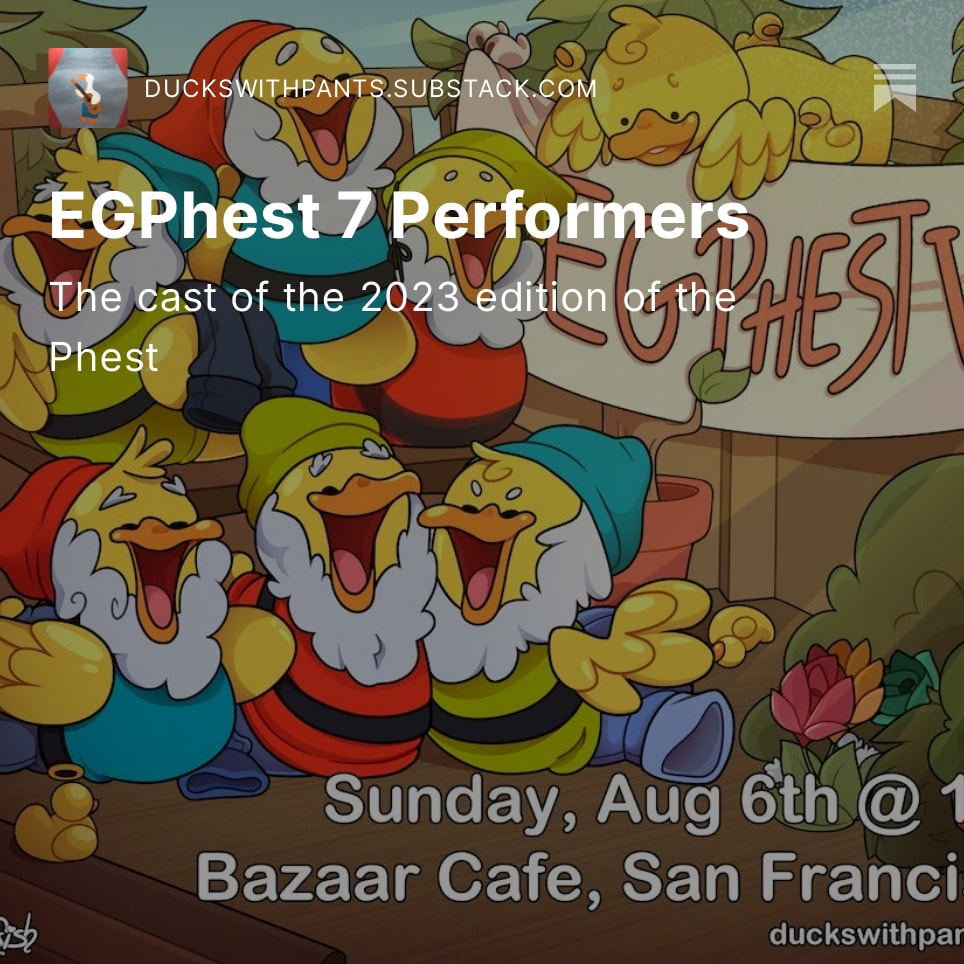
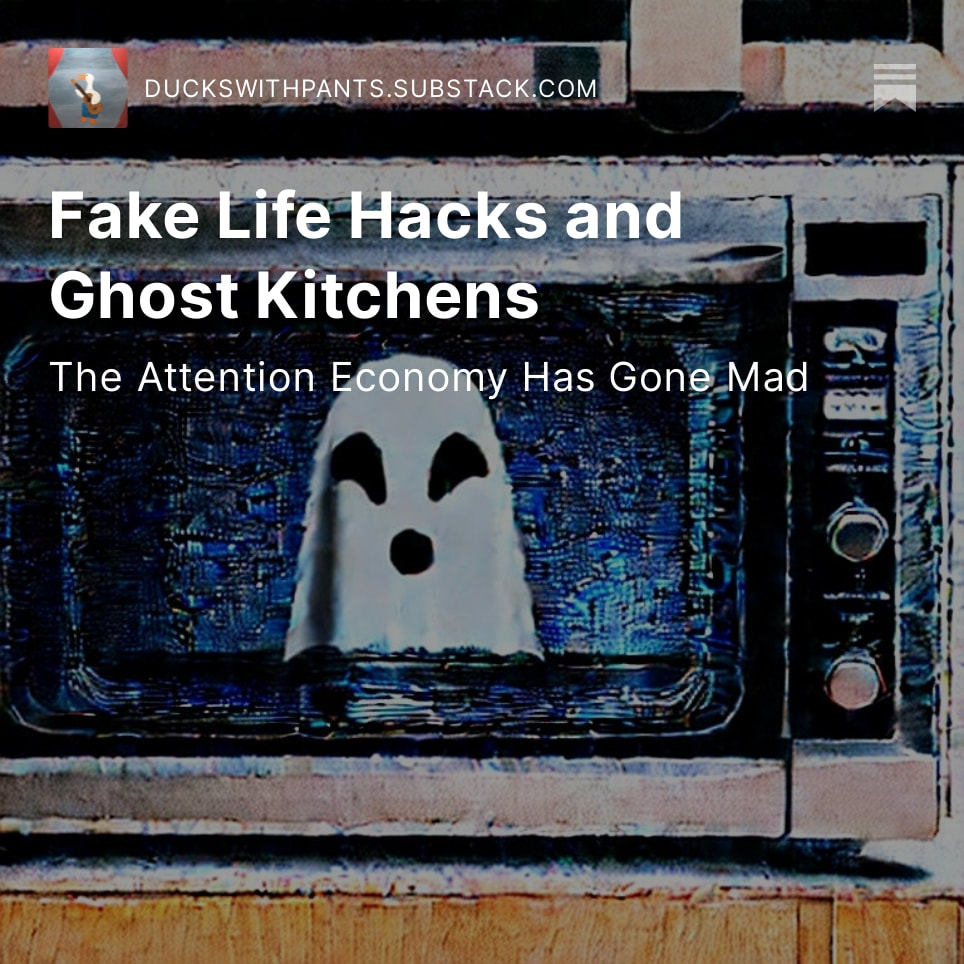
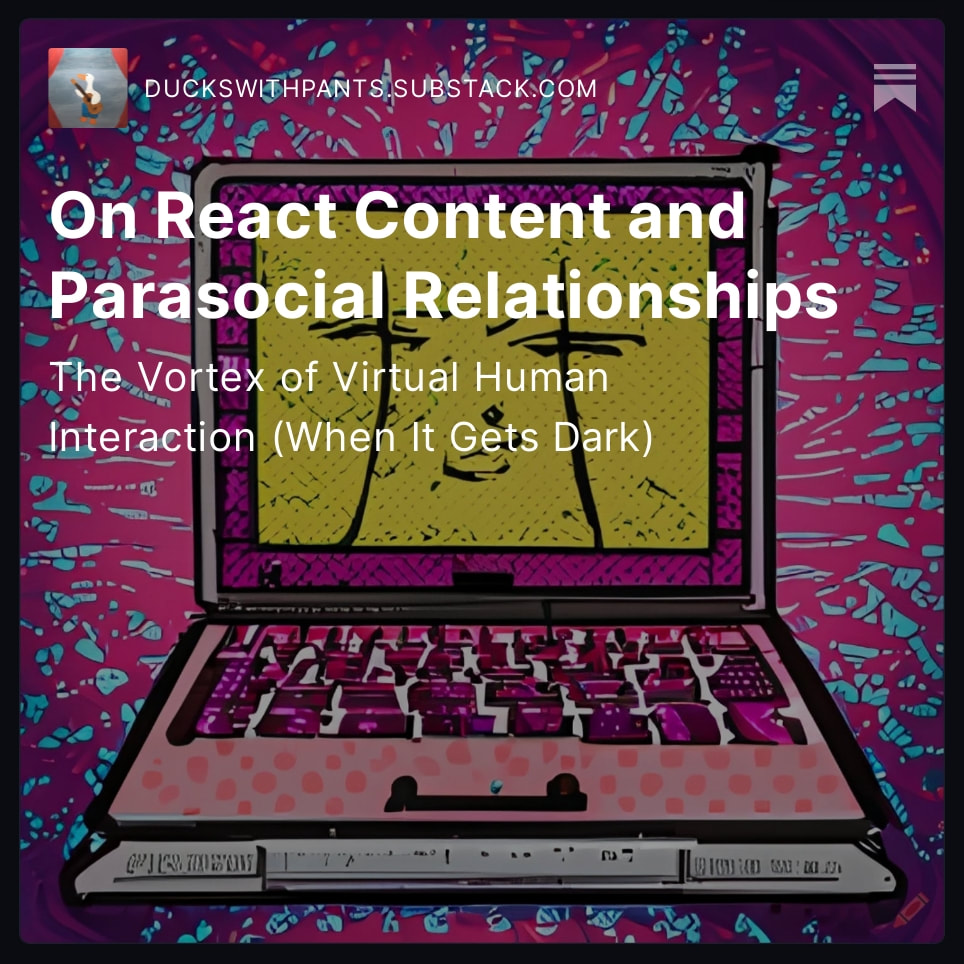
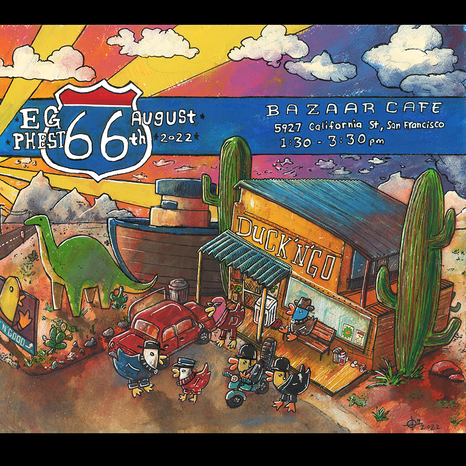
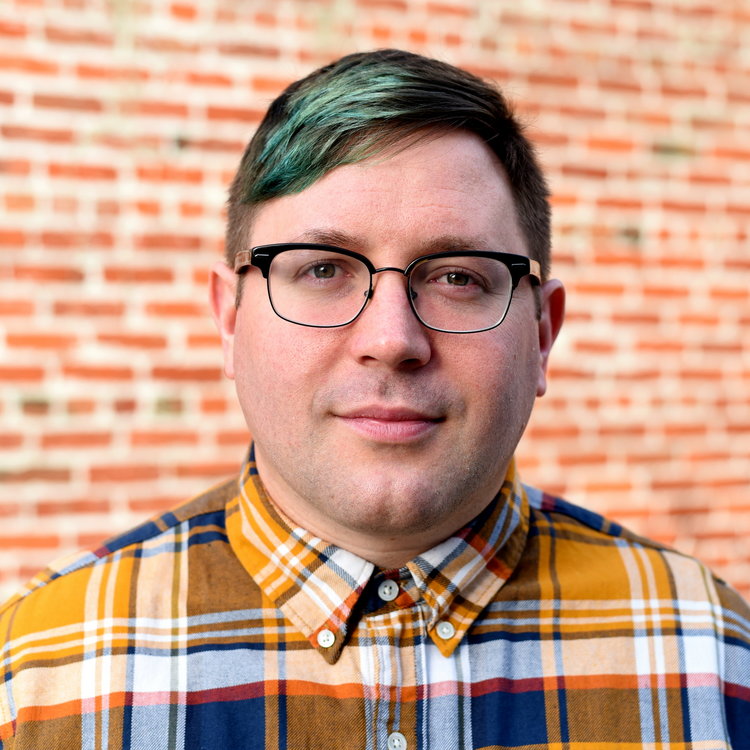
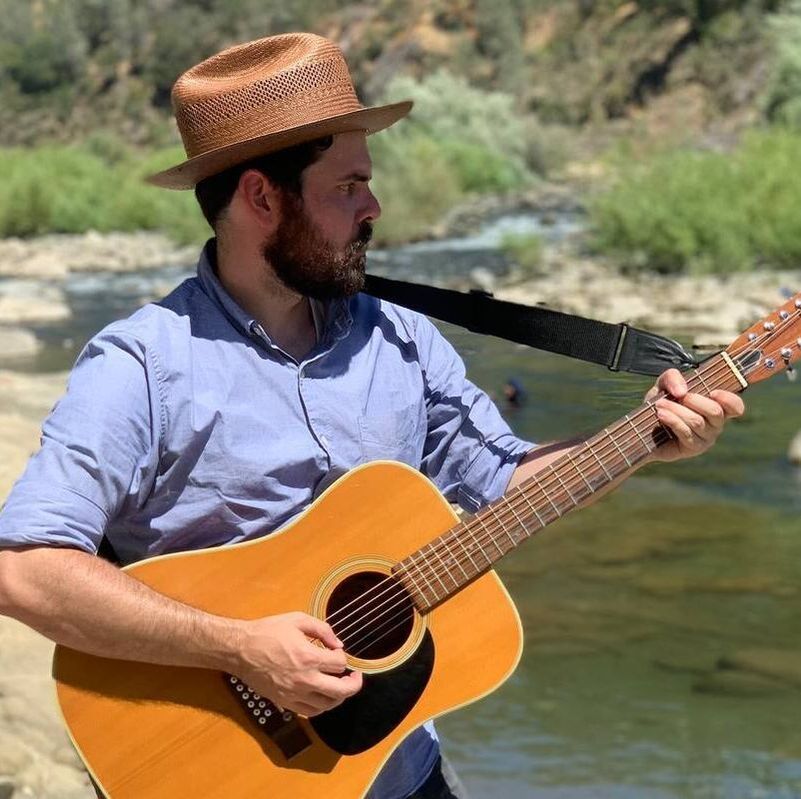
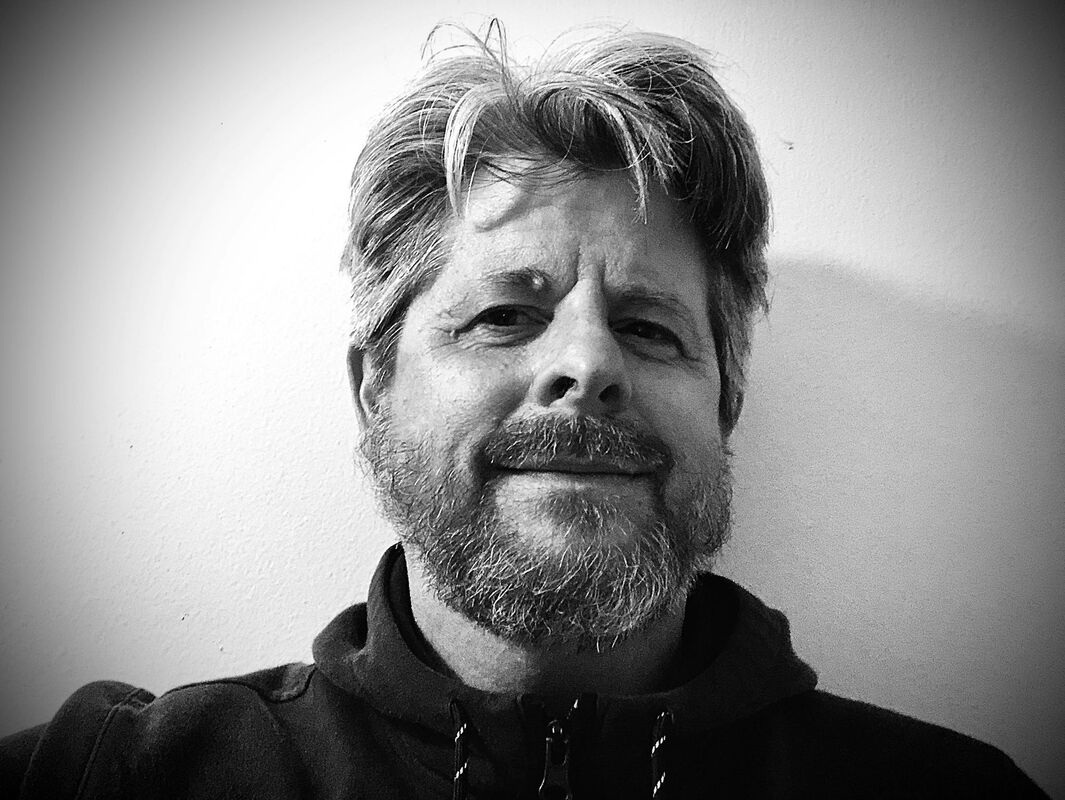
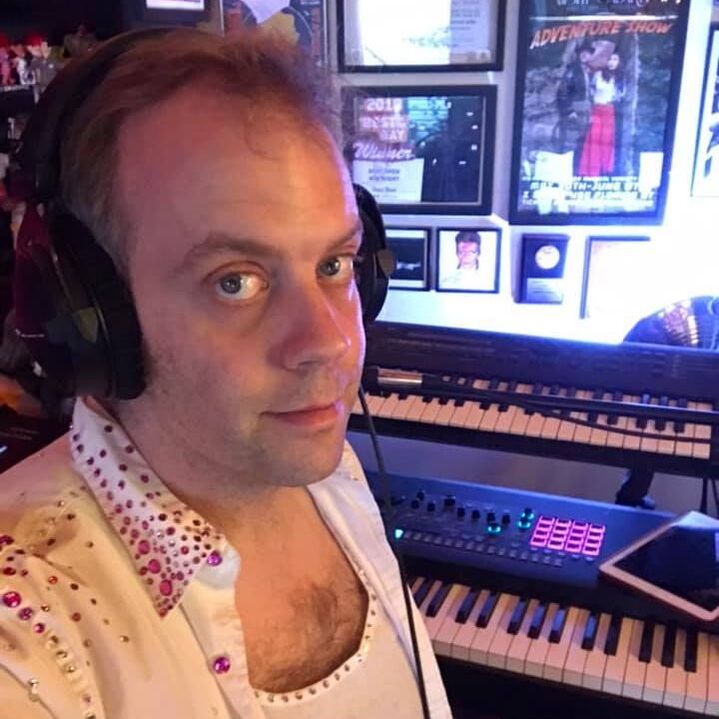
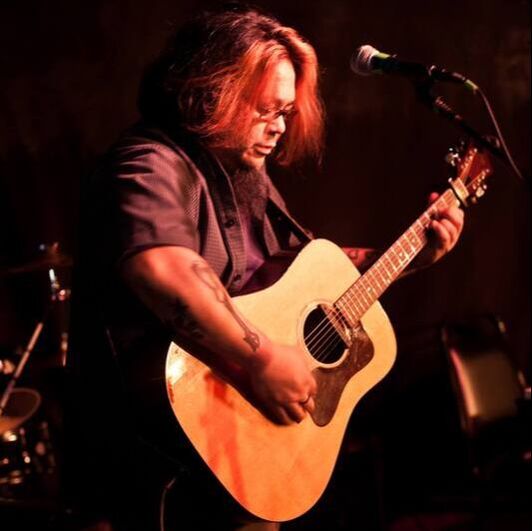
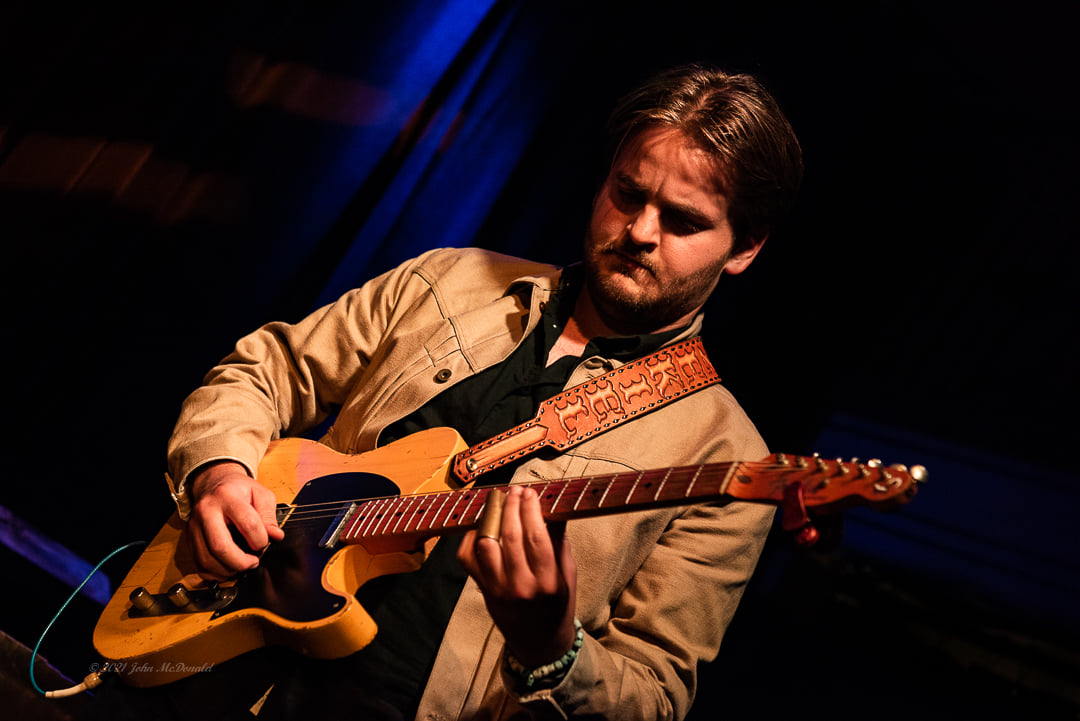


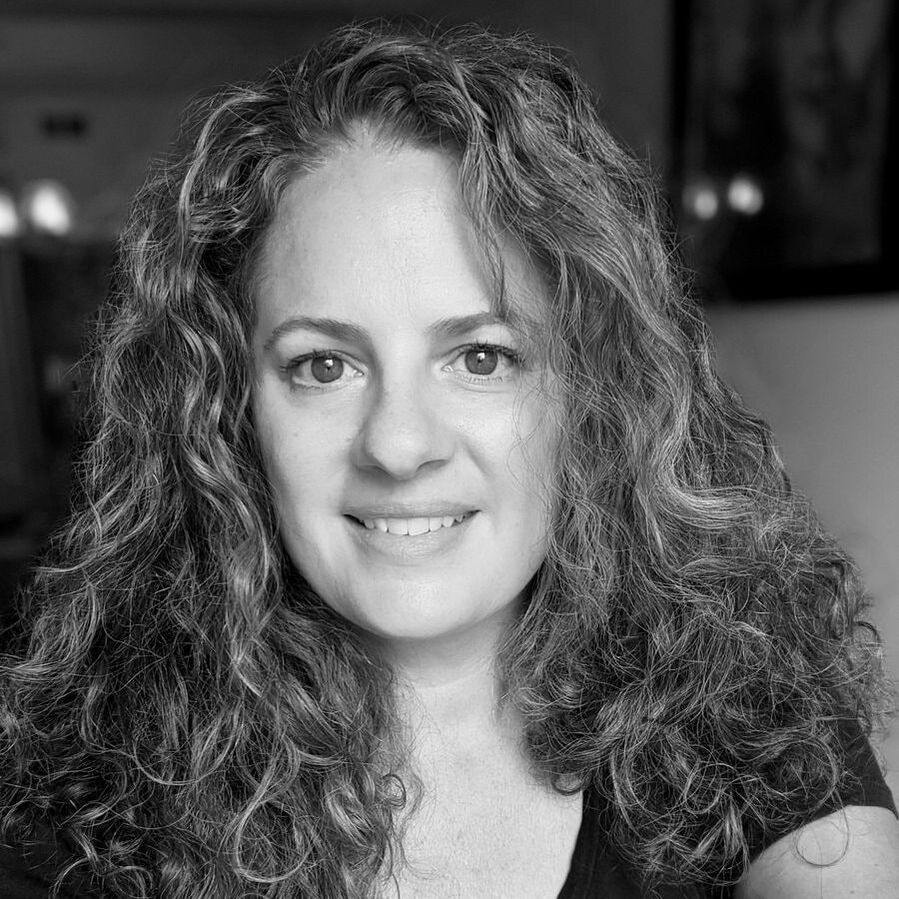
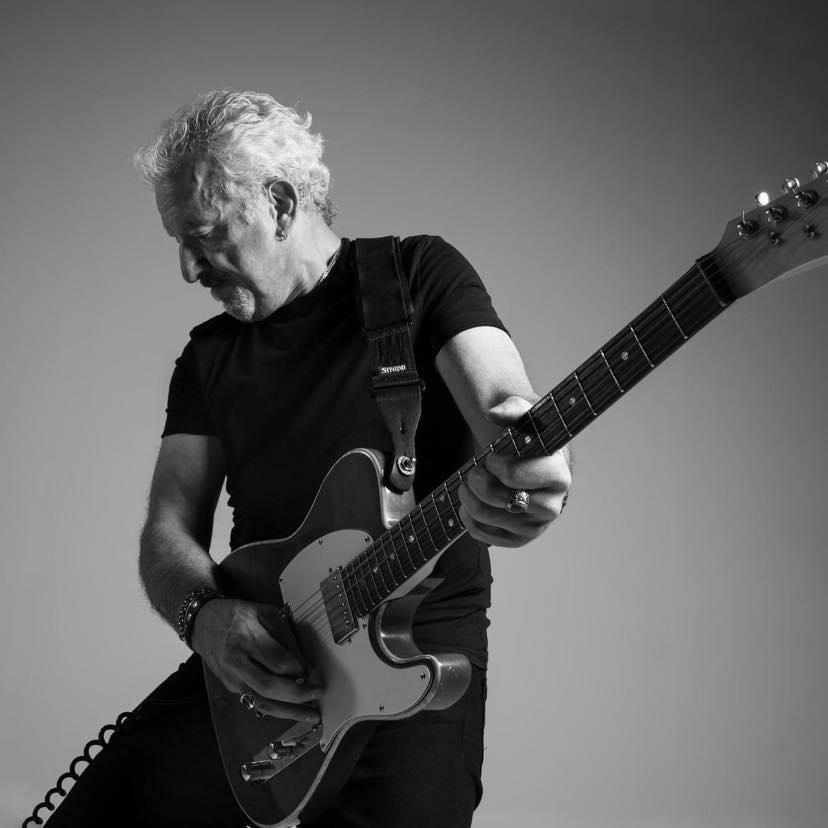
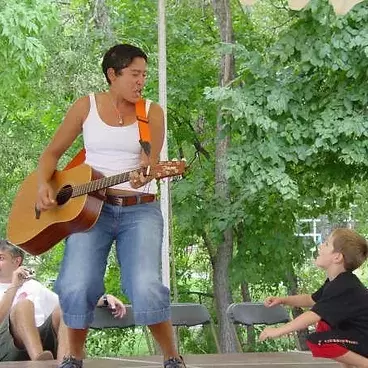
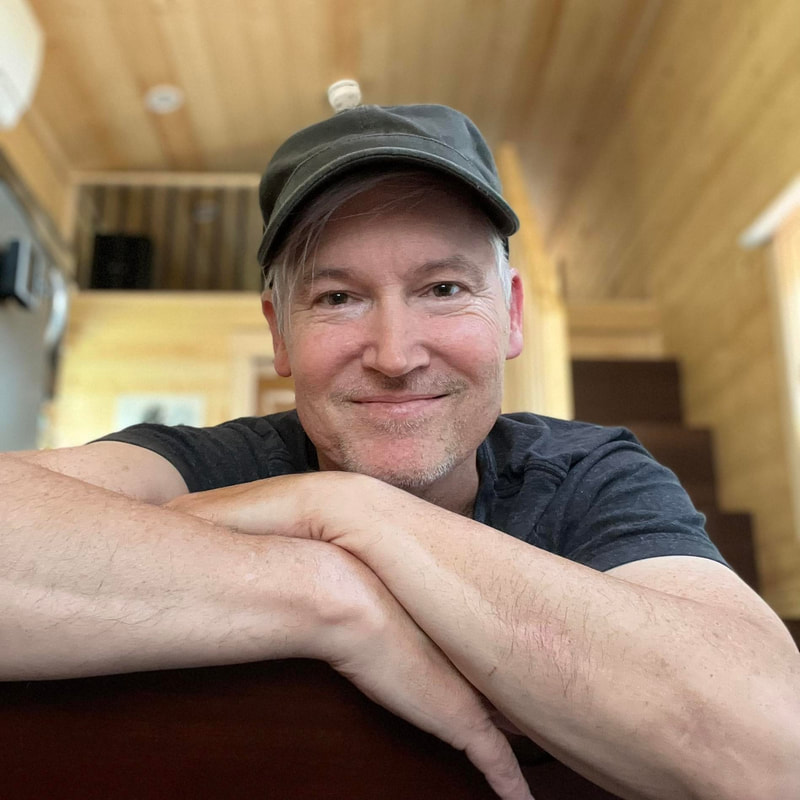
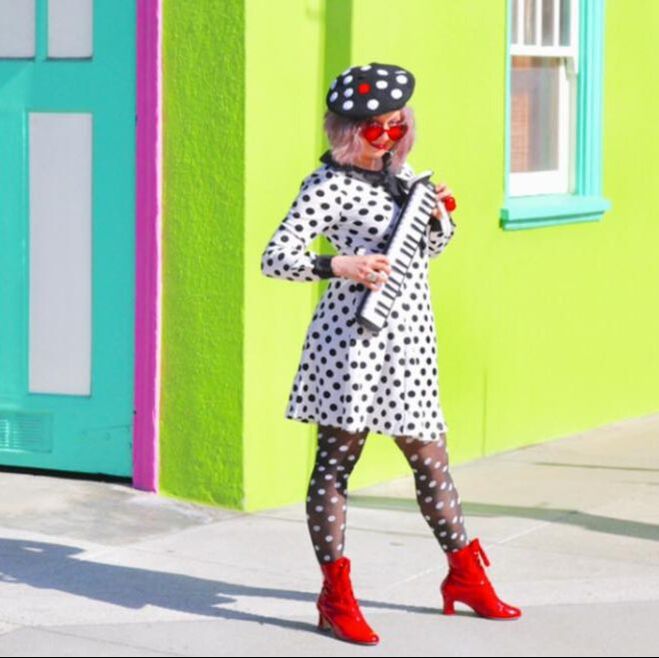
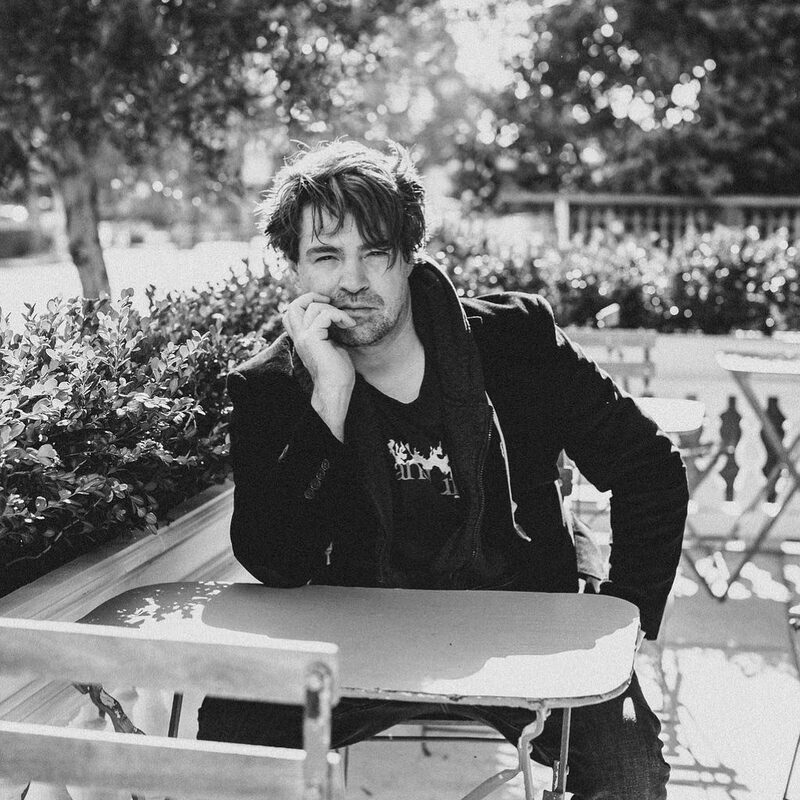
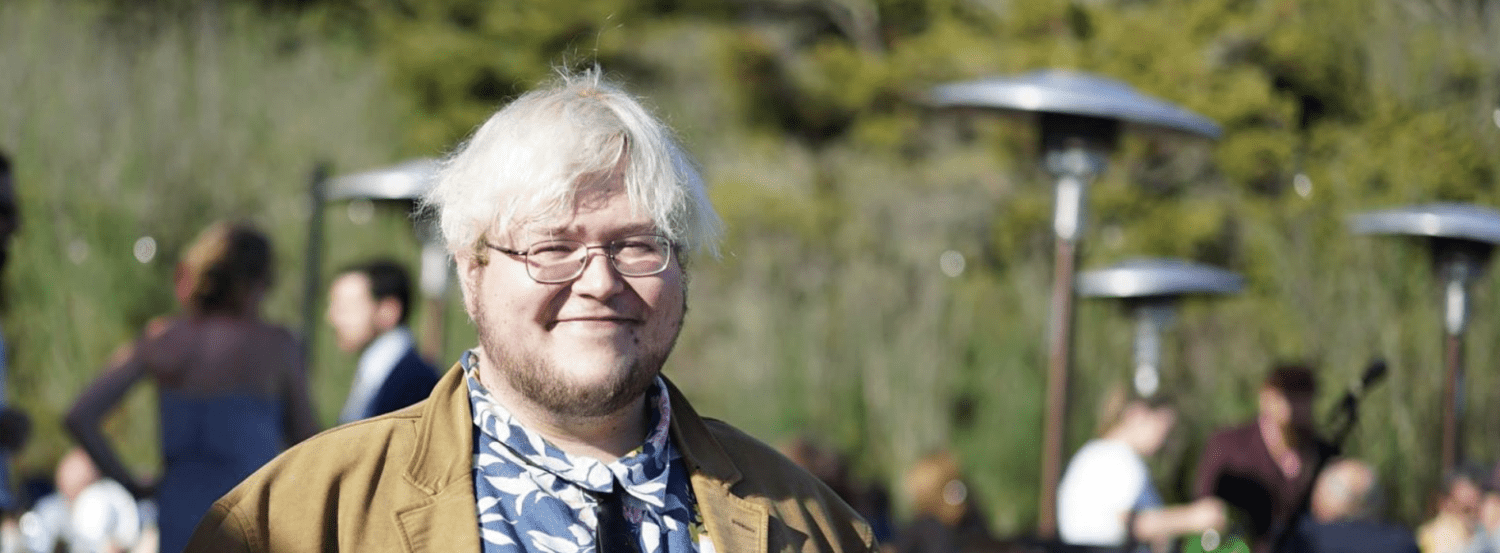
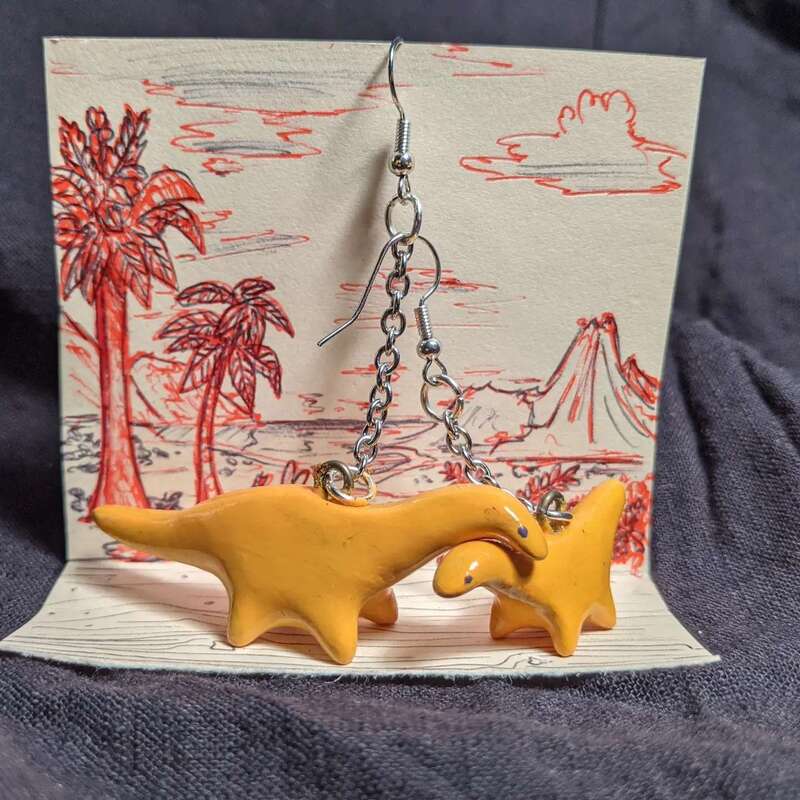

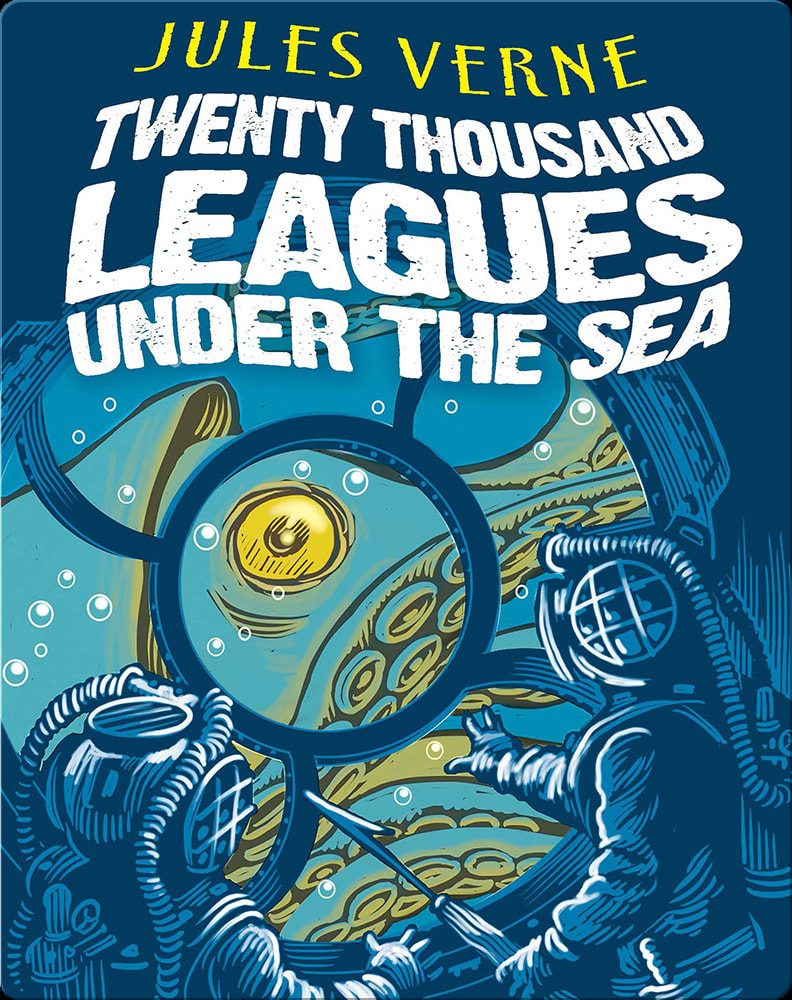
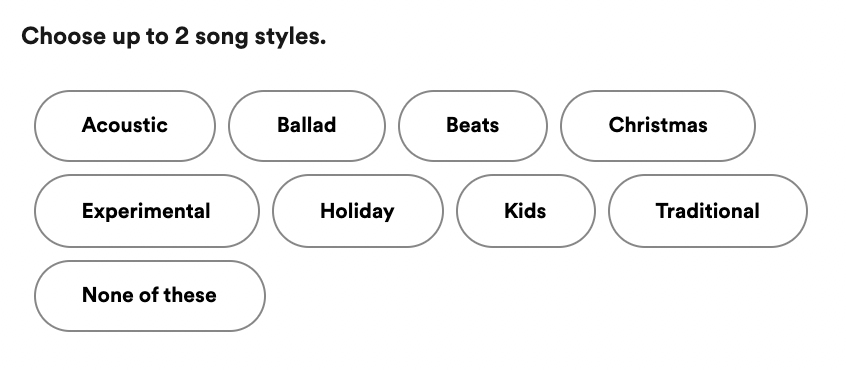
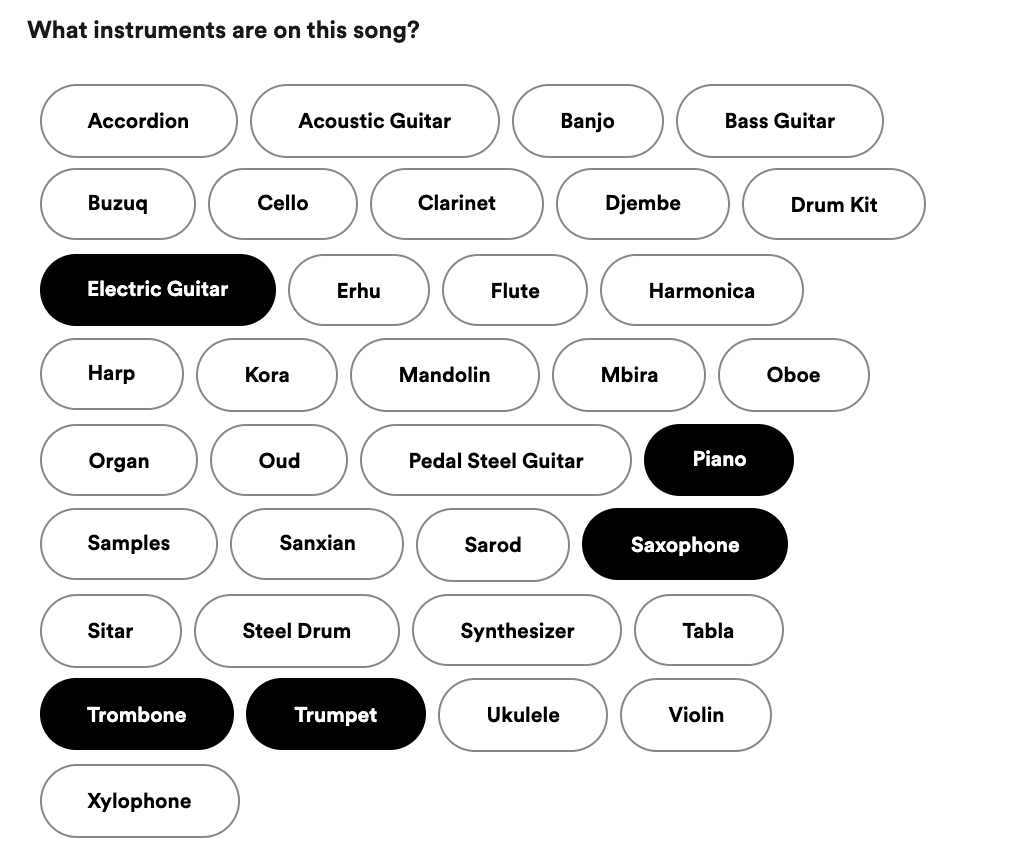
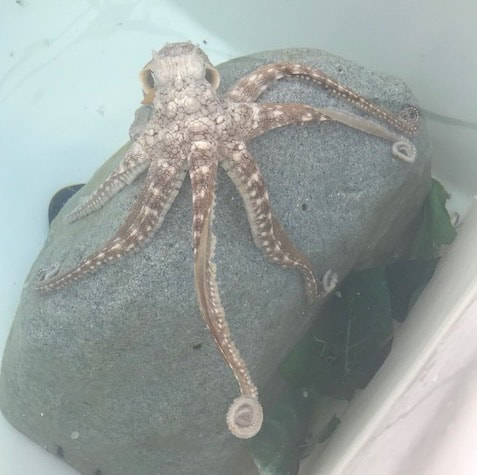
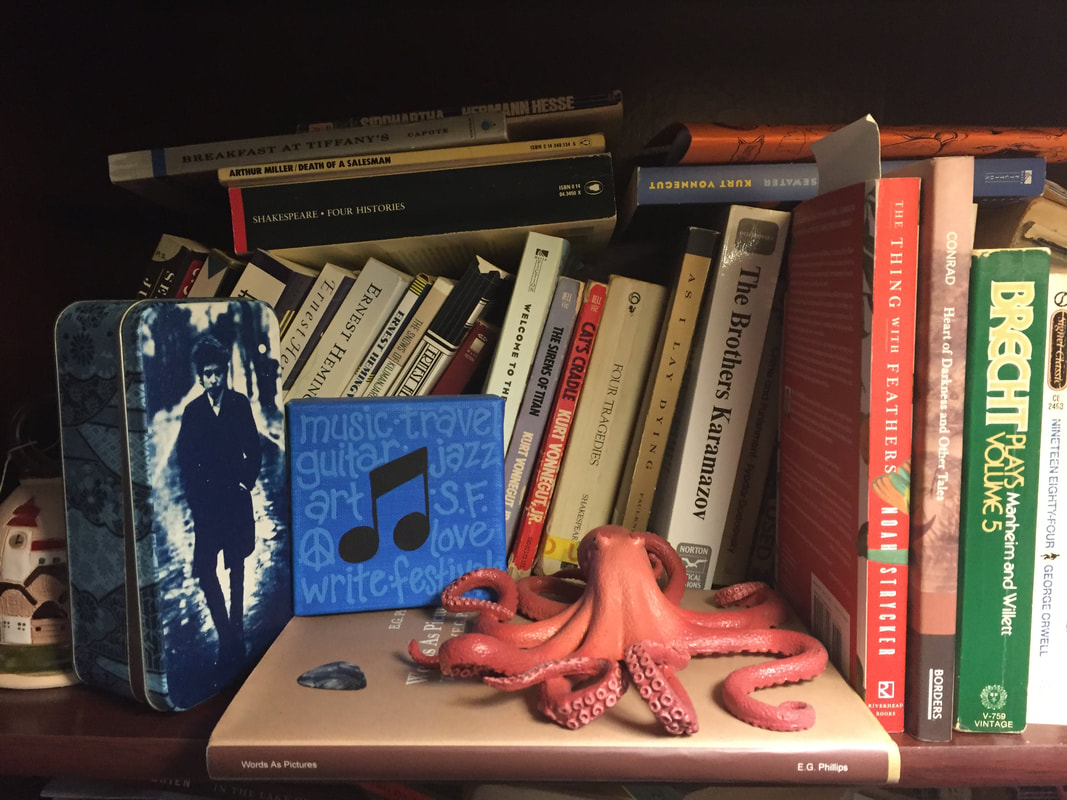
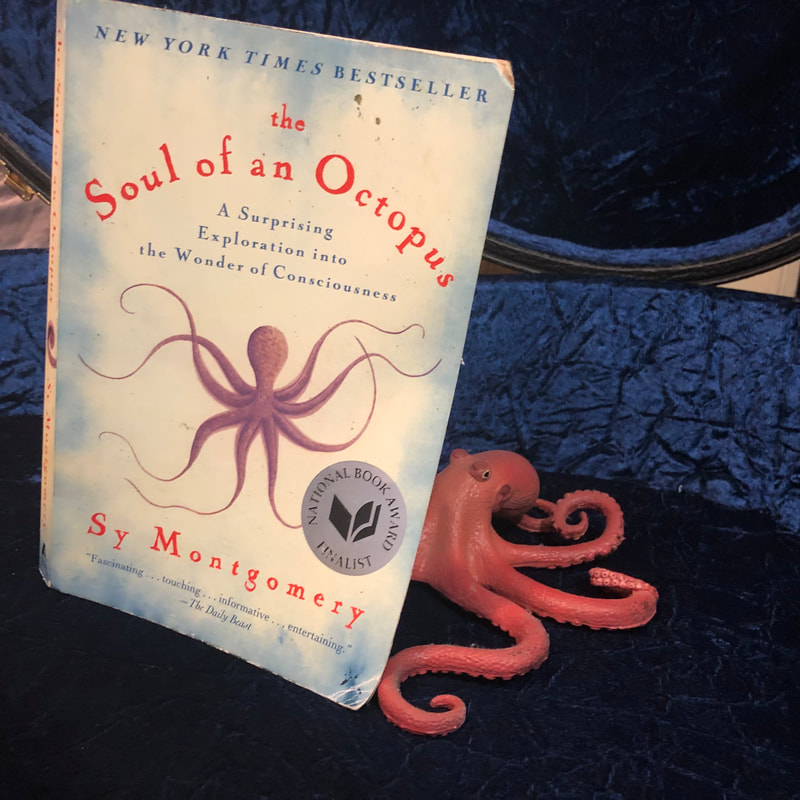

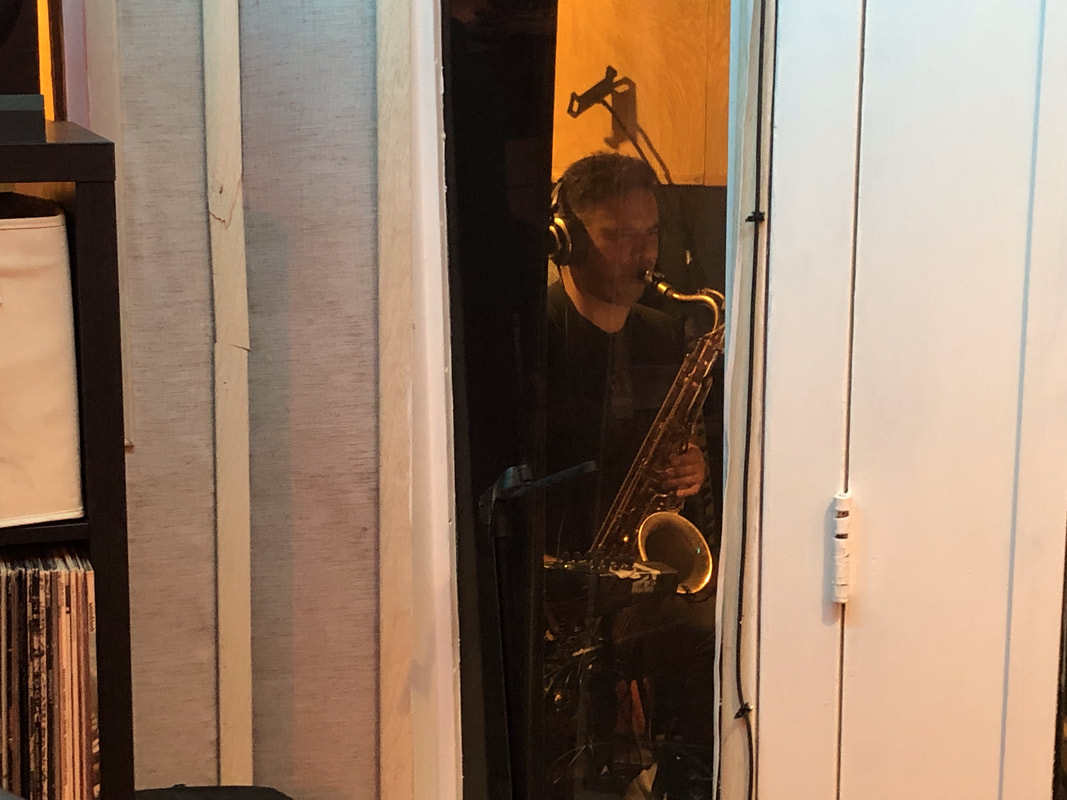
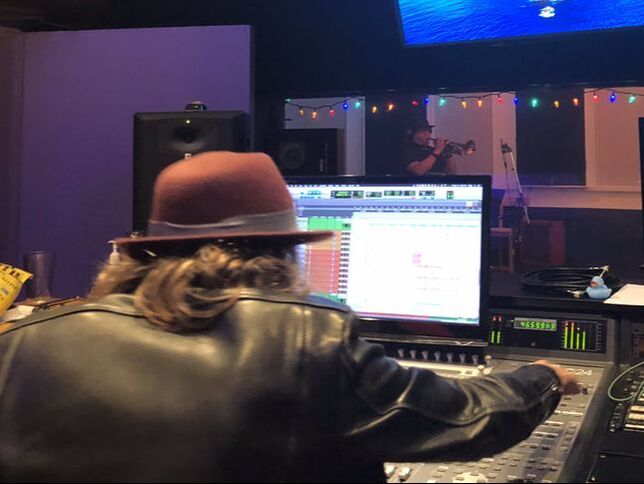
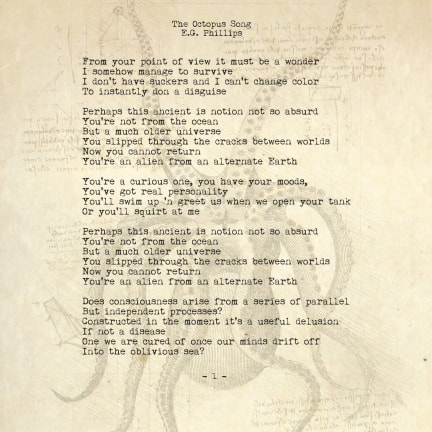
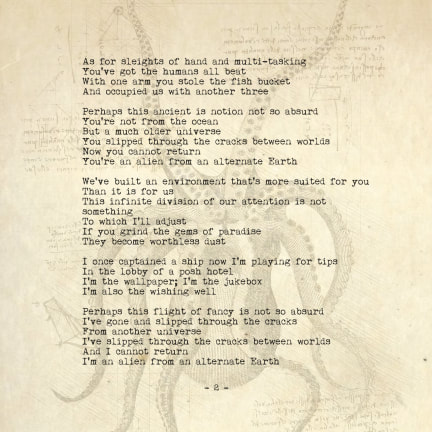
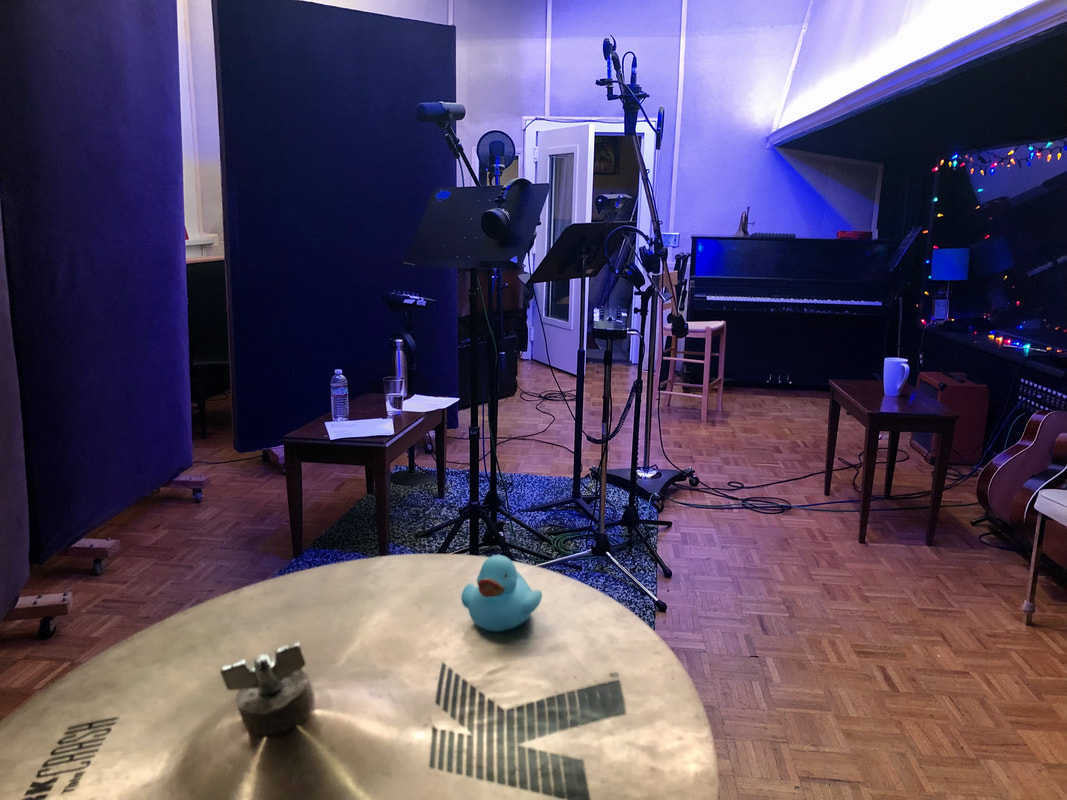
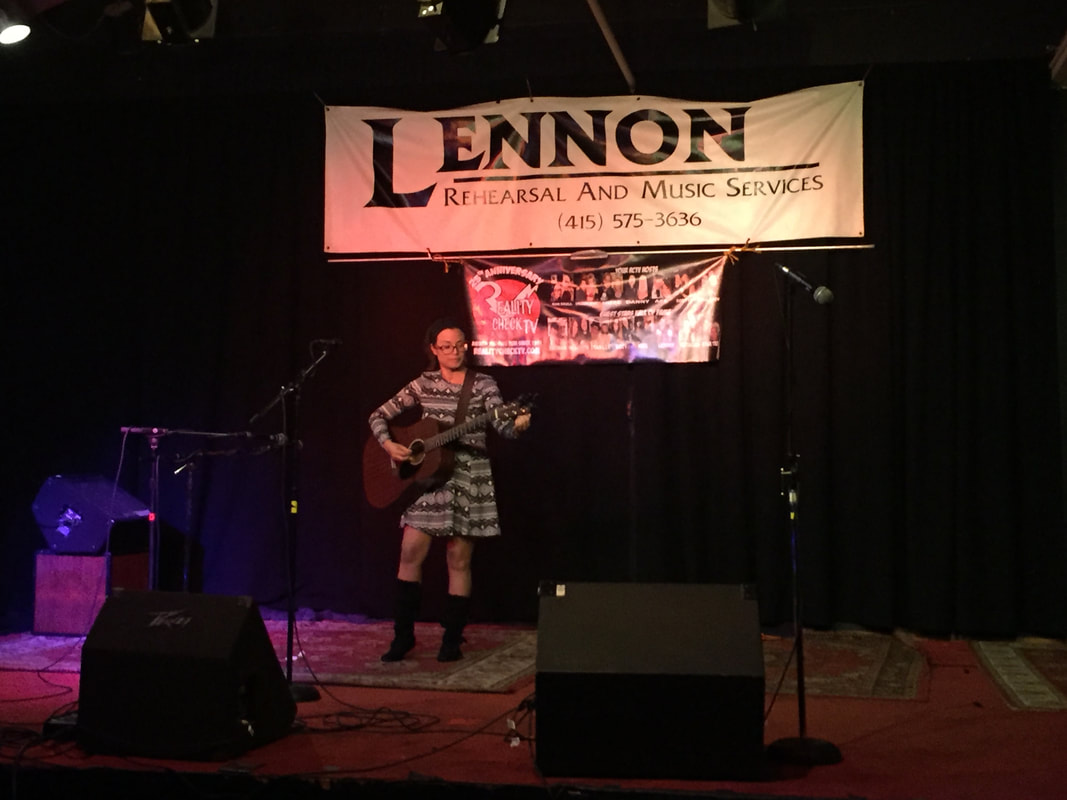
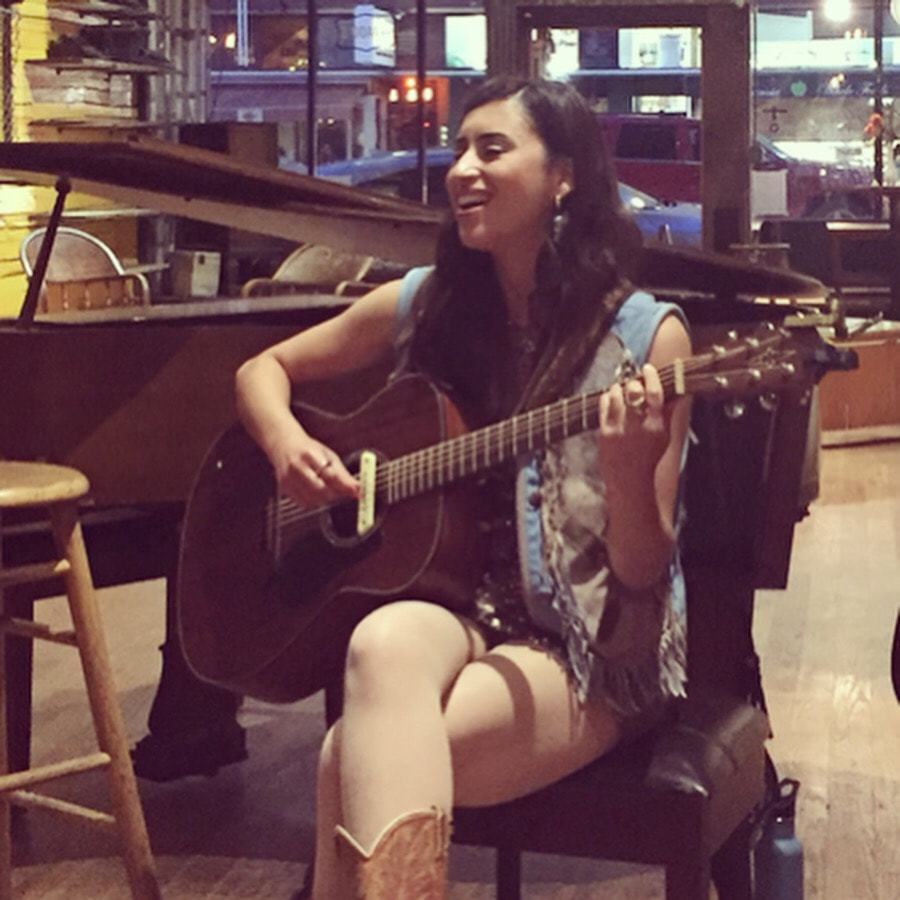
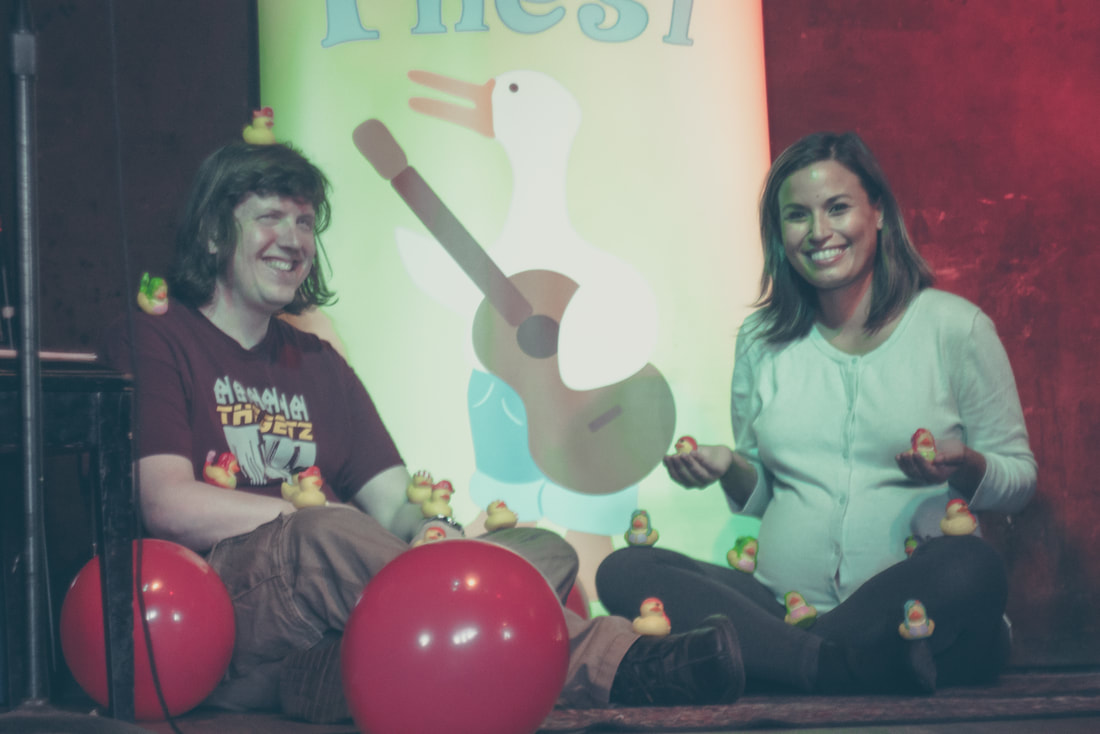
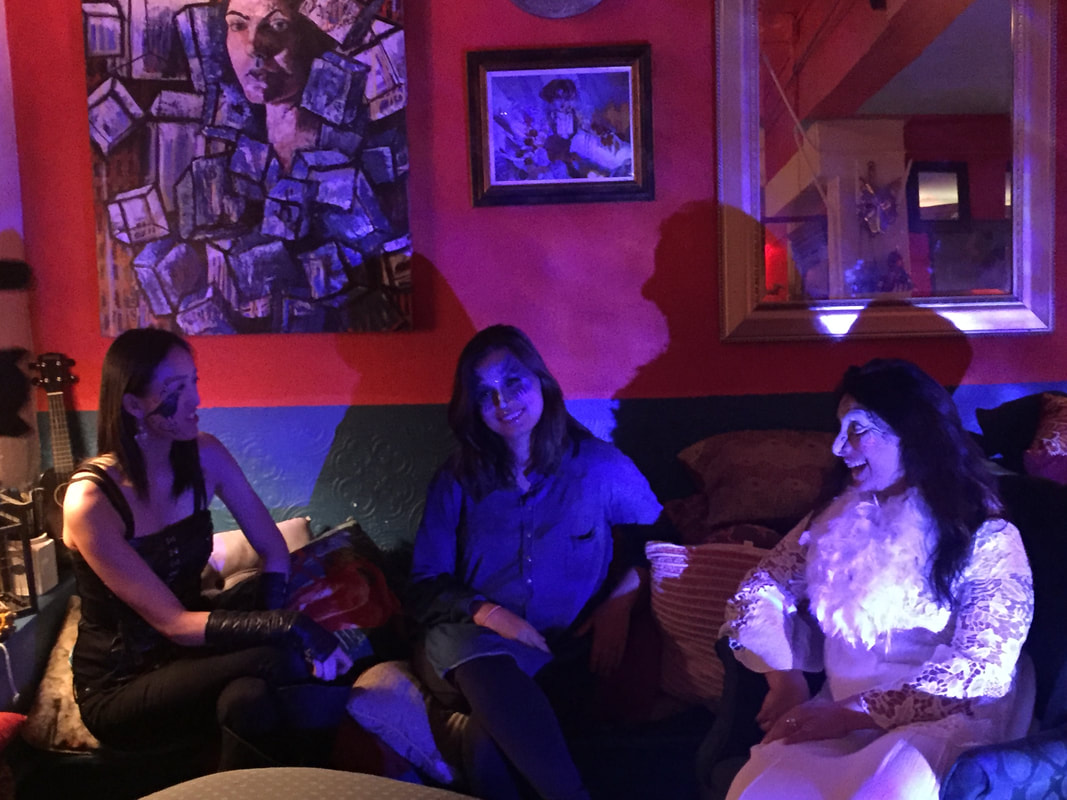
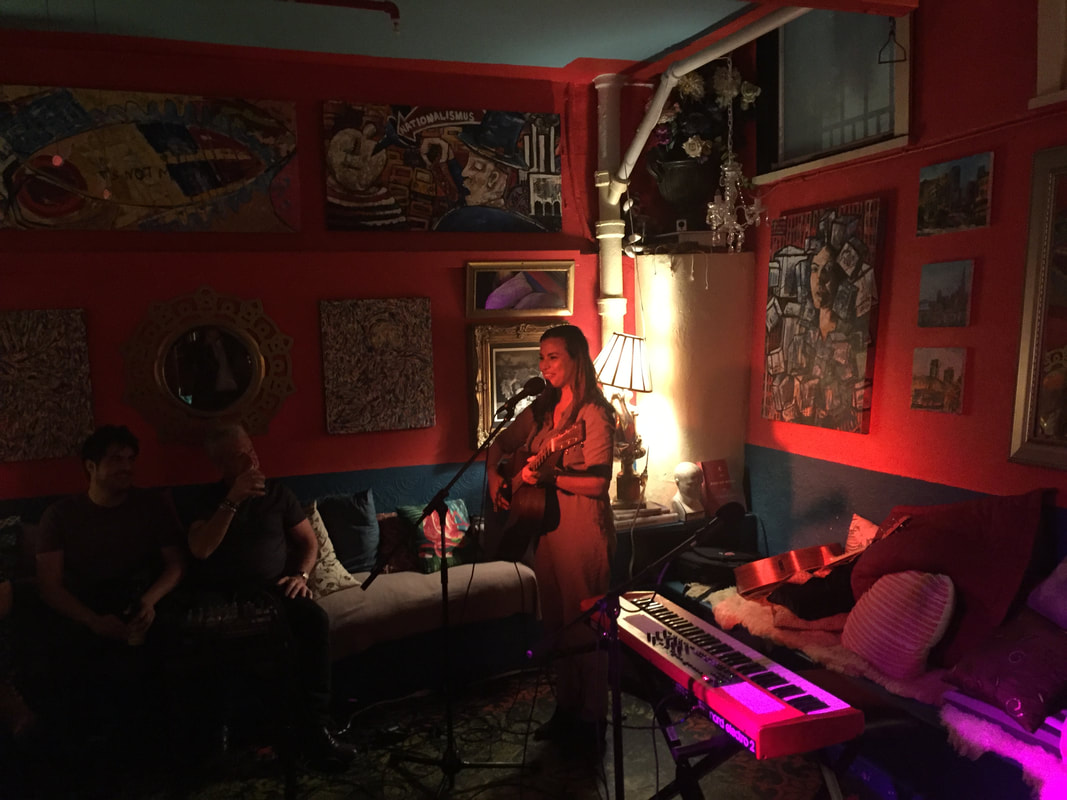

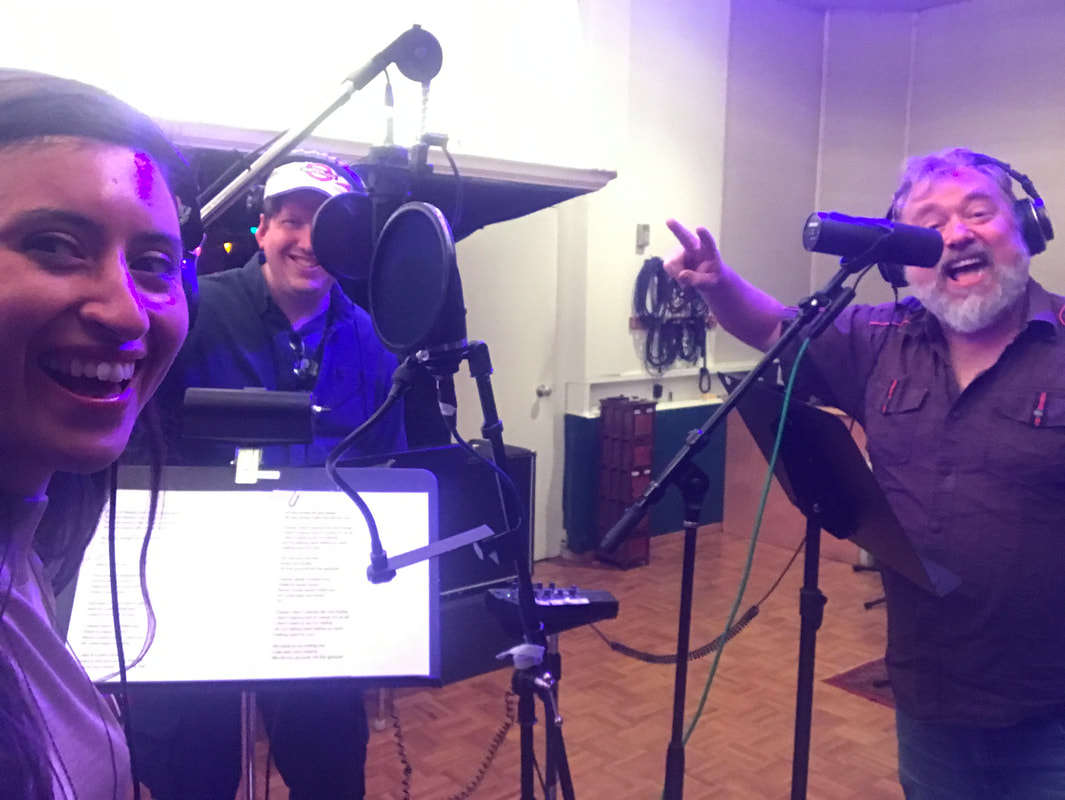
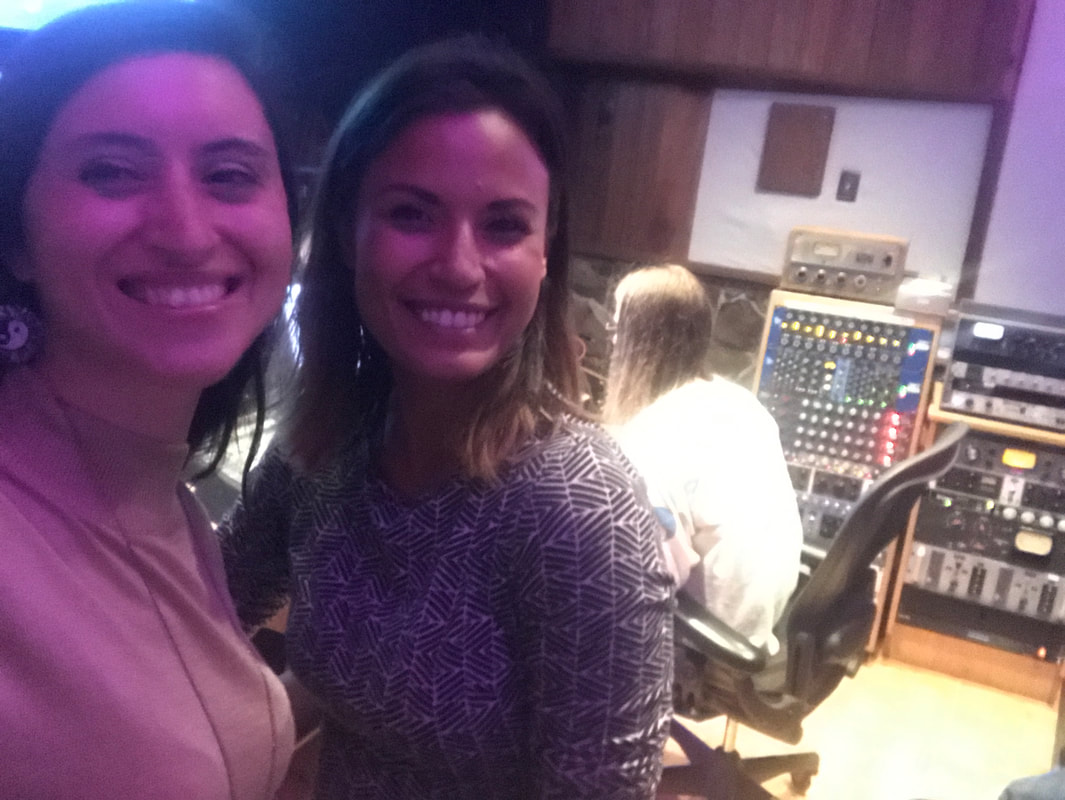
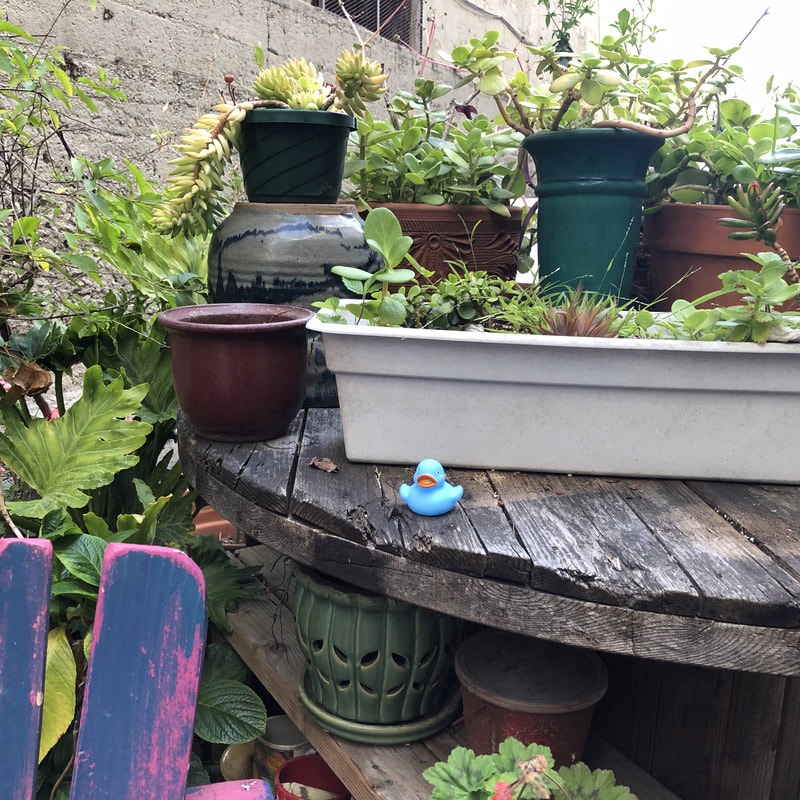
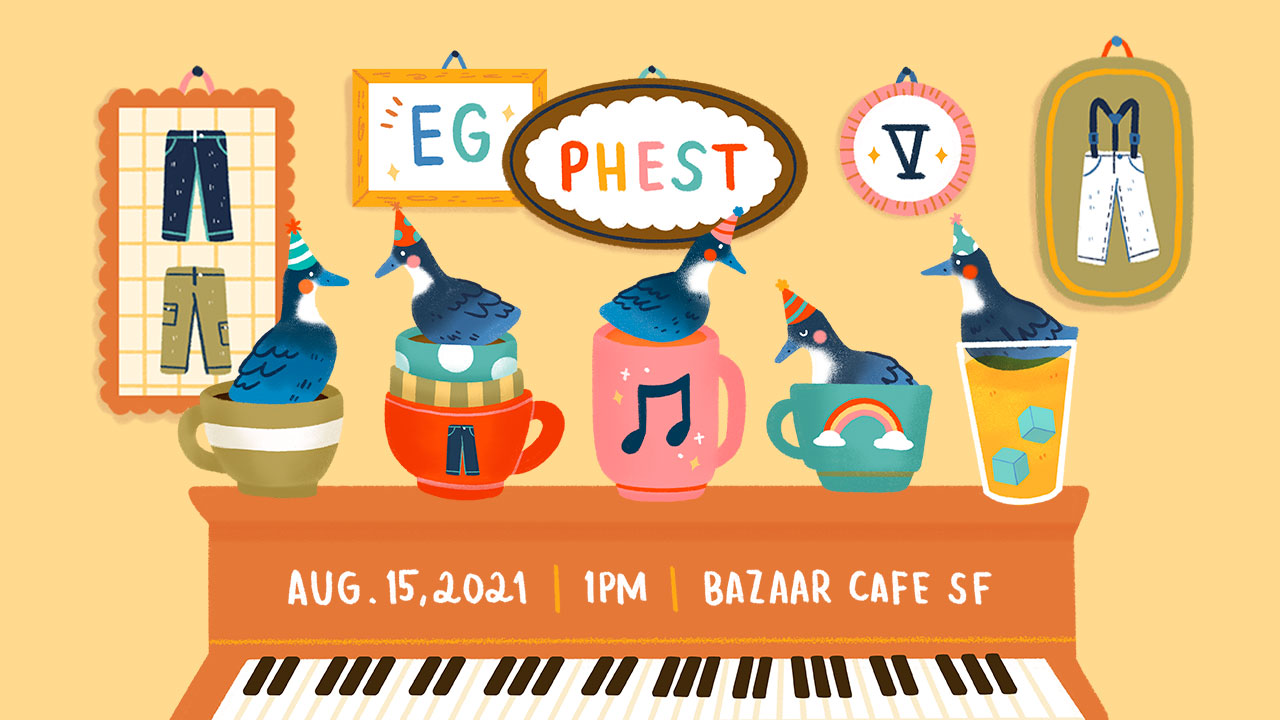
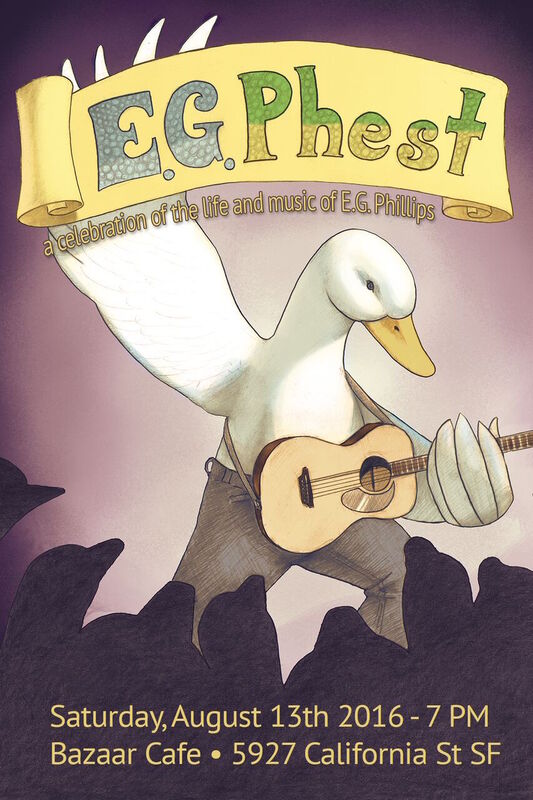
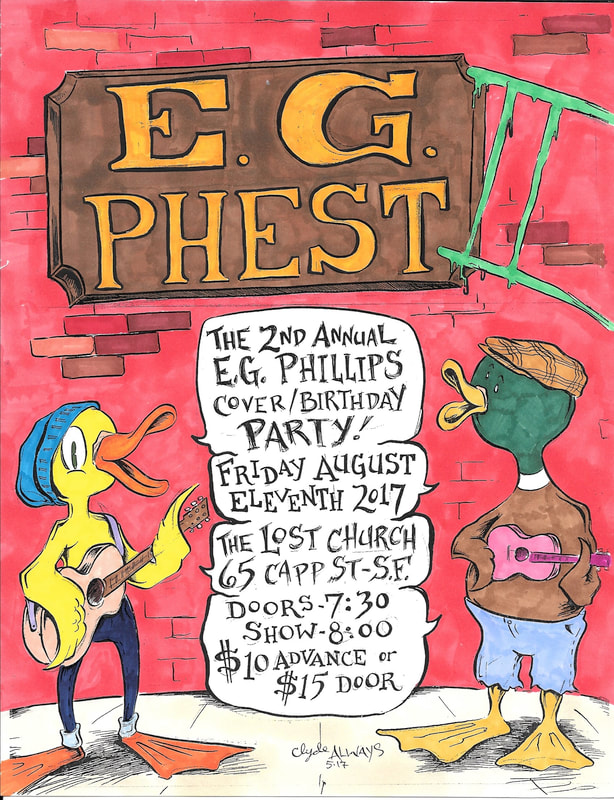
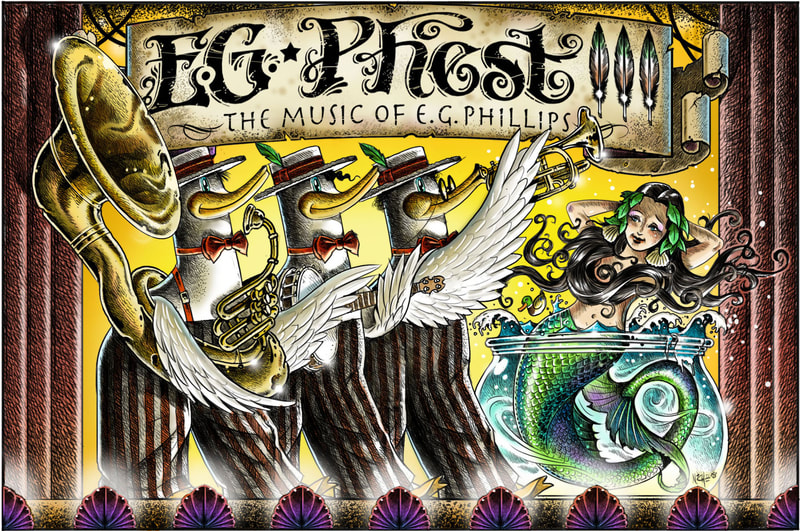
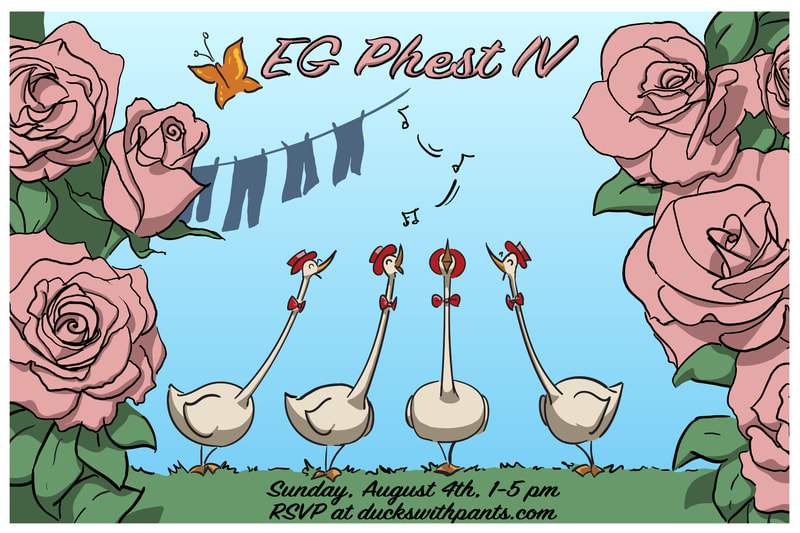
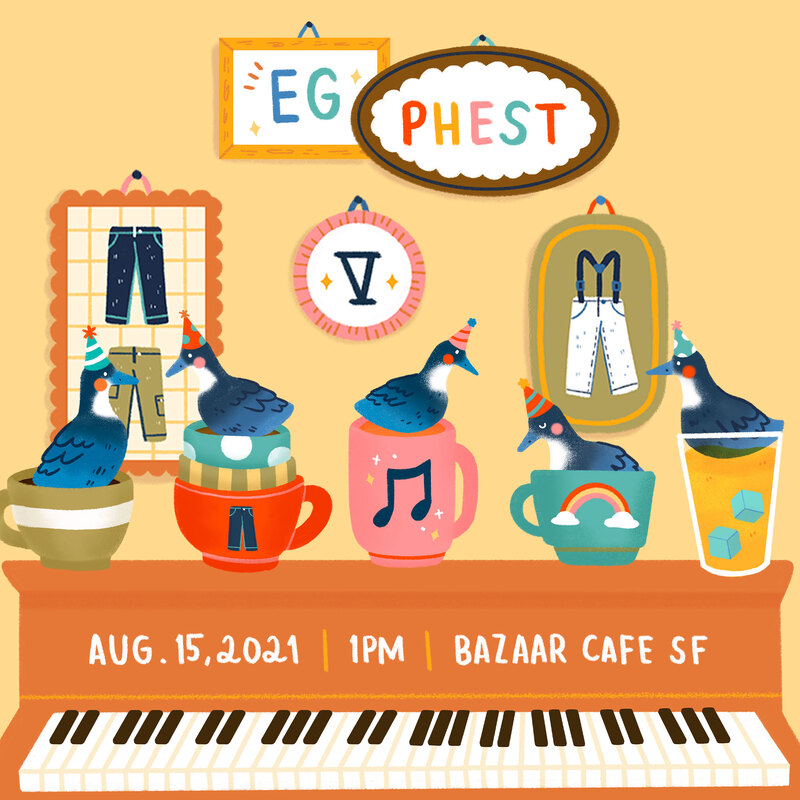
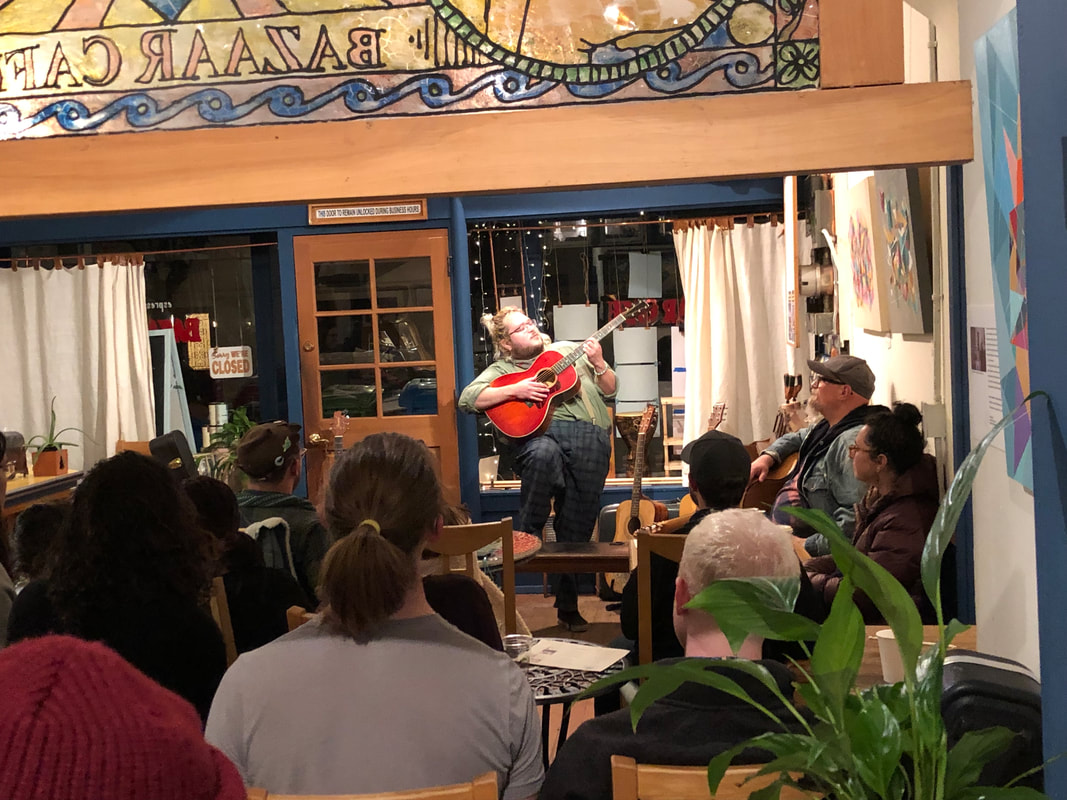
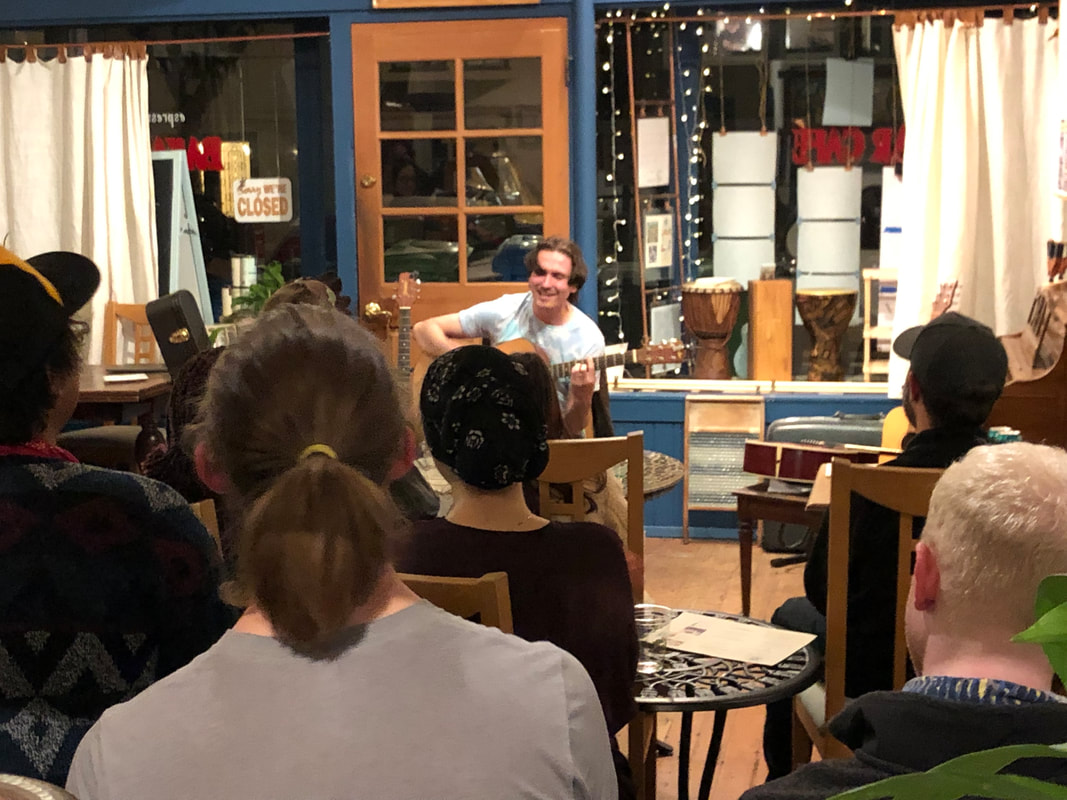
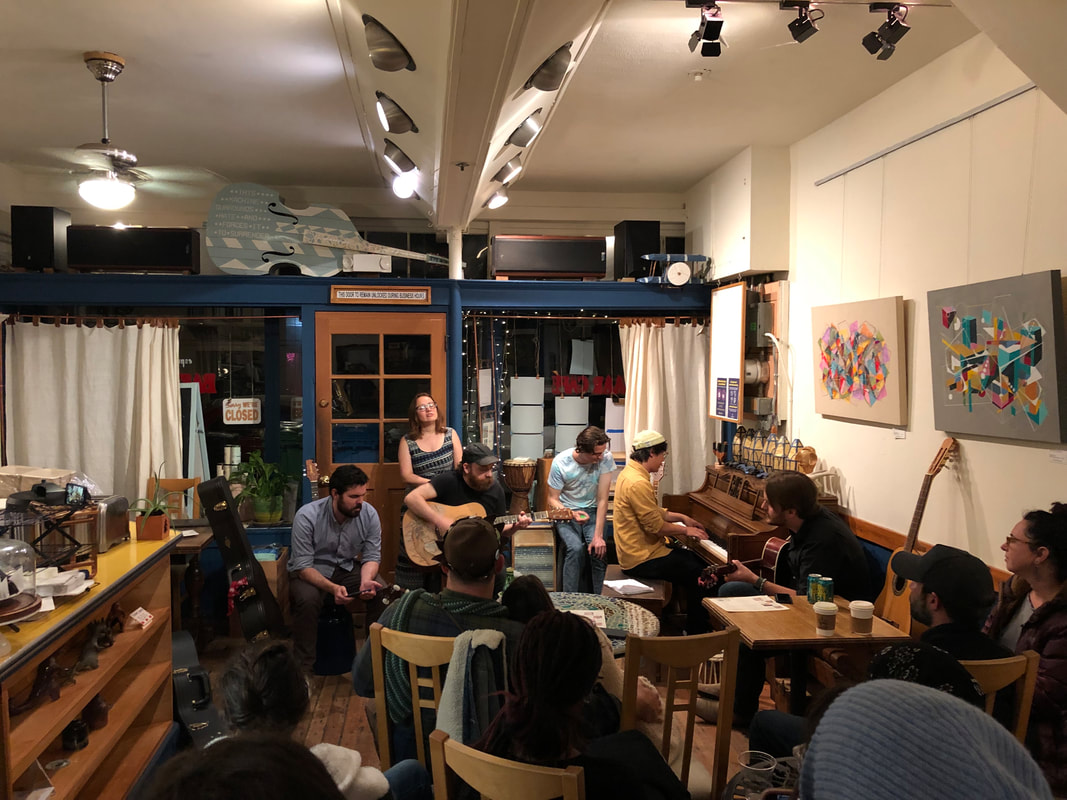
 RSS Feed
RSS Feed